

From Clara Ford to Craft Cocktails: A Culinary Journey Through the Dearborn Inn City.Life.Style.





By Ebony JJ Curry SENIOR REPORTER
By Jeremy Allen EXECUTIVE EDITOR
Late Thursday night, Sept. 14, a historic moment unfolded in American labor relations as the United Auto Workers (UAW) union initiated a strike against Ford, General Motors (GM), and Stellantis. For the first time, the union took simultaneous action against all three major Detroit-based automakers. The action involves approximately 13,000 UAW members in assembly plants across Michigan, Ohio, and Missouri, who walked off their jobs after existing labor contracts expired at 11:59 p.m.
By Ebony JJ Curry SENIOR REPORTER
IFor two decades, the Michigan Chronicle’s Pancakes & Politics has been one of the region’s premier public forums, bringing together top leaders in government, business, and civic life for candid, solutions-oriented conversations. As the series enters its 21st season, it will kick off in a truly historic way: with a live forum from the Detroit Auto Show, the first time in the event’s history that the two powerhouses will join forces. This special edition of Pancakes & Politics will take place on Thursday, January 15, 2026, inside Huntington Place in downtown Detroit, marking a new chapter for both the beloved public series and the city’s signature automotive event.
troiters. The symbolism of Black beekeepers revitalizing their city is a powerful testament to the resilience and ingenuity of our community.
n a breathtaking celebration of talent, determination, and the unyielding spirit of Black excellence, the Michigan Chronicle marked its 10th Annual 40 Under 40 event Thursday evening. This year’s soirée, drenched in the theme “All Black Everything with Gold Accents,” transcended expectations and essentially illuminated the golden gems within the true essence of Black excellence. Hosted by the charismatic duo of Andre Ash and Lynzee Mychael from Michigan Chronicle’s Finally Friday, the night was a triumph for the city of Detroit and its vibrant community of young Black professionals.
By Sam Robinson SENIOR REPORTER
Detroit Mayor-elect Mary Sheffield has tapped attorney Melvin “Butch” Hollowell to lead her transition effort, the group announced in a press release Wednesday morning.
As the night unfolded, we had the privilege of hon oring other outstanding individuals, each carving their own path to success. Clement “Fame” Brown, the creative mind behind Three Thirteen Detroit’s Brand Name, received the prestigious Entrepreneur of the Year Award. Brown’s commitment to empowering the city through fashion and entrepreneurship has left an indelible mark.
Rise Higher Detroit says its mission is to deliver on Sheffield’s vision of an administration rooted in the needs of the community.
The evening sparkled with a golden promise as we celebrated remarkable individuals from various walks of life. Among the honorees were the brilliant and visionary co-founders of Detroit Hives, Nicole Lindsey and Timothy Paul Jackson. Their work has not only changed the landscape of beekeeping and urban farming in Detroit but also exemplified the transformative impact Black professionals can have on their communities.
The Pancakes & Politics series has long been a platform for bold dialogue and crucial discussions about the issues that impact communities throughout Michigan. With its focus on bringing together leaders from diverse sectors –inclusive of government, business, and the community – the forum has earned a reputation for being the place where unfiltered, solutions-driven ideas are shared. As the auto industry continues to undergo rapid changes, this year’s launch promises to elevate these conversations to new heights, with a global audience watching from the heart of Detroit’s automotive world.
Shortly before midnight on Sept. 14, GM released a statement expressing disappointment with the strike action, despite offering what it termed an “unprecedented economic package” that included historic wage increases. Stellantis also expressed disappointment in a statement, saying the company immediately went into contingency mode to protect its operations.
“Entrepreneur of the year – that’s a big deal,” said Brown. “It’s always an honor to be honored and it’s always a blessing to be in a room full of so many talent ed, accomplished, and popular people that look like me. I’m geeked. I started making and selling clothes as a kid and I always knew that I would have a business, but I never knew it would be Detroit’s brand name business, so I take a lot of pride in the fact that our business rep resents our city’s pride.”
By Ebony JJ Curry SENIOR REPORTER
“This effort is the boldest and most community-centered transition Detroit has ever seen and is guided by the same values that have defined Sheffield’s leadership: collaboration, equity, and opportunity for all… Mayor-elect Sheffield is launching the most ambitious and inclusive transition engagement effort in the city’s history, designed to ensure that Detroiters are shaping the path forward.”
Taking home the Corporate Excellence Award was Dannis Mitchell, Director of Community Engagement at Barton Malow.
by I-375?
“Together we have created a social, environmental, and financial impact through bees,” said Jackson. Lindsey followed that sentiment with, “It is through our local partnerships and collaborative efforts that we exist in over 28 plus locations managing the health of 4.5 million honeybees – humbly speaking our movement has inspired others locally, nationally, and even internationally to take on similar missions.”
This unique collaboration with the Detroit Auto Dealers Association (DADA) is a natural evolution for Pancakes & Politics, which has consistently been at the forefront of shaping policy, addressing local concerns, and inspiring action. The partnership with the Detroit Auto Show, the largest and most iconic automotive event in North America, signals a strategic move to elevate the significance of the conversations that have made Pancakes & Politics a cornerstone of Detroit’s civic and business landscape.
The UAW has branded the industrial action as the “Stand-Up Strike,” focusing on specific plants within each automaker. UAW President Shawn Fain stated, “This strategy will keep the companies guessing. It will give our national negotiators maximum leverage and flexibility in bargaining. And if we need to go all out, we will. Everything is on the table.” Union leaders have also indicated that additional plants could be targeted in future waves if negotiations remain stalled.
For many Detroiters, Interstate 375, or I-375, has long been just another stretch of urban highway, a concrete artery connecting different parts of the city. To some, it’s a mere convenience; to others, it’s an unremarkable part of their daily commute. However, there’s a deeper, far more troubling story beneath the surface of this seemingly ordinary freeway—a story of pain, displacement, and the lasting impact on Black Detroiters.
Detroit Hives, a pioneering organization founded by Lindsey and Jackson, harnesses the power of urban beekeeping to revitalize neighborhoods in the Motor City. Their initiative not only addresses critical issues like environmental conservation but also provides valuable education and employment opportunities to Black De-
Rise Higher Detroit will be chaired by Hollowell, who is currently the managing partner of The Miller Law Firm Detroit, and is the former corporation counsel for the City of Detroit. Known widely for his commitment to civil rights and civic leadership, Hollowell has been recognized by the Michigan Chronicle as a Men of Excellence honoree and as a member of its Power 50 list of the region’s most influential Black leaders. His selection underscores the Mayor-elect’s intention to build a transition rooted in integrity, community engagement, and equity.
“It is so important to recognize that there are young leaders across the country, many that are born here in Detroit. I represent our city nationally and I tell people, ‘Yea I’m a D-girl I’m from the west-side of Detroit,’” Mitchell expressed. “But more importantly, I’ve been able to have experiences within an industry that not many of us, specifically women of color, have the opportunity to engage in and I’ve been the youngest person in the room, the only Black person in the room, and the only Sistah in the room, and I really had to articulate the importance of showing up, giving chances when others won’t, and being persistent.” As a trailblazing Black woman thriv ing in a predominantly male-dominated industry, her unwavering commitment to fortifying the connections between businesses and Detroit’s communities is
The group said in a release that it won’t use public or campaign funds for the effort, instead relying on the city’s philanthropic communities.
By Andre Ash DIGITAL ANCHOR
“We are excited to announce the launch of the 21st season of Pancakes & Politics in collaboration with the Detroit Auto Show,” said Hiram E. Jackson, Publisher of the Michigan Chronicle. “For 20 years, Pancakes & Politics has served as a space where leaders come together to exchange bold ideas that ultimately shape policy and move communities forward. This partnership with the Detroit Auto Show underscores the weight and importance of these conversations—not just for Detroit, but for the entire nation. It’s an honor to have this platform recognized on such a prominent stage, and we look forward to exploring how the changing landscape of the auto industry intersects with the future of our city and our nation.”
Fain clarified the union’s strategy: “I want to give a major shoutout to the thousands of members who are on the picket lines right now fighting for all of us. The Stand-Up Strike is a new approach to striking. Instead of striking all plants at once, select locals will be called on to stand up and walk out on strike. This is our generation’s answer to the movement that built our union – the sit-down strikes of 1937. We told the Big 3 that Sept. 14 was the deadline and we meant it. We gave the companies our economic demands eight weeks ago and it took more than a month to get to the table.”
The tale begins in what is now Lafayette Park, once known as Black Bottom—a neighborhood rooted in African-American culture and history. Named after its dark, fertile soil, Black Bottom flourished during the mid1900s, nurturing the dreams and aspirations of prominent Detroiters like Coleman Young, Joe Louis, and numerous other Detroit legends. But in the name of urban renewal in the 1950s, this vibrant neighborhood was systematically dismantled, erased from the map, and replaced by a lifeless stretch of asphalt.
“The Mayor-elect and Detroit’s philanthropic community have collaborated to create a fund, established at the Community Foundation for Southeast Michigan and supported by a variety of foundations and other civic institutions, to fund transition efforts, including community engagement and talent acquisition.
A Holistic Approach to Providing Shelter and Support for Detroit’s Unhoused People
While the residential areas bore the brunt of this demolition, the heart of Black Bottom, its thriving business center, remained largely untouched. Restaurants, theaters, clubs, and bars—the very places that brought Detroit’s Black community together—were concentrated around Hastings Street, the epicenter of African-American culture in the city.
For those familiar with the history of Pancakes & Politics, it’s clear why this
The union is pushing for a comprehensive list of demands. This
Homelessness continues to plague urban communities, with families and individuals grappling with the challenges of making ends meet in today’s economic climate. Whether it’s struggling to meet monthly mortgage payments or coping with soaring rental costs in a housing market marked by shockingly high prices, a variety of factors contribute to the growing issue of people becoming unhoused.
The Rise Higher Detroit transition team says it is a people-powered process to turn community priorities into action. The incoming administration is inviting Detroiters to play an active role in setting policy priorities and identifying new talent for city leadership. The initiative’s website, RiseHigherDetroit.com, will serve as a hub where residents can learn about job opportunities, share their perspectives, and register for upcoming community meetings. The transition team is already collecting résumés to match Detroiters’ skills and experiences to forthcoming positions in city government, with new opportunities to be posted periodically.
Meagan DunnJulie Schneider
Historically, shelters have provided a temporary respite for those in need, often serving as the first or second option after exhausting alternatives like staying with friends or family. Shelters offer a place to rest one’s head and a warm meal, albeit sometimes for extended periods. For others, being unhoused means living in cars or makeshift outdoor
Then, in a cruel twist of fate, Hastings Street, too, was obliterated a few years later, making way for the construction of I-375. This marked the final blow, sealing the fate of Black Bottom and signaling the beginning of the end for Paradise Valley, the Black busi-

all Detroit residents. This initiative simplifies access to the City’s various housing services, ensuring that residents in need can easily find assistance.
nomic growth, and reconnect the neighborhood with the rest of Detroit. It is a step
swiftly to the
in violence, DPD
its deployment plans. Rather than waiting for

By Michigan Chronicle Editorial Board
By Lynzee Mychael MULTIMEDIA JOURNALIST
The causes of homelessness are as diverse and complex as the individuals experiencing it. In response, the City of Detroit has adopted a holistic approach to combat this issue.
“Providing services and high-quality housing to persons at risk of or who are experiencing homelessness is a key priority of the City of Detroit, said Julie Schneider, Director of Detroit’s Housing and Revitalization Department.
As Detroiters watched the mayoral contest unfold, Mayor-Elect Mary Sheffield’s momentum was undeniable, and it was evident by her decisive win that the city wanted her to be the city’s next mayor.
“This means focusing on building the pipeline of supportive housing and coordinating with the Continuum of Care on the delivery of critical resources such as emergency shelter, rapid rehousing, and diversion and prevention programs. It also means preserving and expanding affordable housing options for Detroiters of all incomes and improving housing stability though comprehensive service offerings available through the Detroit Housing Resource HelpLine and Detroit Housing Services Division within HRD.”
“The city and its partners offer a lot of great services to help Detroiters with their housing needs, but they don’t mean much if people don’t know how to access them,” said Mayor Mike Duggan. “Thanks to the efforts of our partners and the generous support of the Gilbert Family Foundation, we now have a simple process to guide residents to the right housing resource and a growing number of programs to help them.”
The Gilbert Family Foundation’s broader commitment involves pledging $500 million to support projects across Detroit over the next ten years, with housing initiatives being a significant part of their contribution.
But even though Rev. Solomon Kinloch Jr. did not emerge as the next mayor of our city, his candidacy was far from a defeat in a larger sense. Instead, it was a reaffirmation of something vital about Detroit – that serious, rooted, values-driven
In May 2023, the City of Detroit launched the Detroit

From the days of the Great Migration when thousands of Black families flocked to Detroit in search of jobs and a better life, to the pivotal role they played in the city’s cultural and musical heritage, Black Detroiters have left an indelible mark on the city. However, in recent years, Detroit has experienced significant gentrification, which has raised concerns about the displacement of long-standing Black residents. Similar to a setting sun, there’s a rising spirit, and Black Detroiters are reclaiming their place in the city, despite the challenges posed by gentrification.
Notably, Detroit has witnessed a consistent decrease in recent years, with the number of unhoused residents steadi ly declining. In 2019, approximately 7,847 people were unhoused and entered the City’s community response system. In 2021, about 5,687 people experienced homelessness.
According to the City of Detroit, since the start of the fiscal year 2019 to 2021, Detroit saw a 28% decrease in the

they deployed officers in the spring itself to address the situation. The rise in visitors to the Greektown area is evident in data from Placer.ai, a location analytics company specializing in visit trends and demographic insights through geolocation-enabled mobile devices. From May 1-Aug. 27, 2022, there were 1.3 million visits and 655,000 visitors to Greektown, according to Placer.ai. In the same period this year, these numbers increased to 1.4 million visits and 670,000 visitors.
As Detroit’s downtown area continues to attract both residents and visitors, the police department has implemented various enforcement measures to manage the increased population. Notably, metal detectors have been strategically placed throughout Greektown to deter the illegal carrying of firearms.
“We have strategically placed them at key points, “ Chief White explains. It has been a deterrent for some, and some have tested it. If you are legally carrying a weapon and carrying a CPL, have a great day. If you’re
During the Great Migration, thousands of Black families from the South came to Detroit in search of jobs in the booming automobile industry. Despite facing discrimination and segregation, they built vibrant communities on the city’s east
and west sides. Over time, these neighborhoods became centers of Black culture and entrepreneurship. According to Historian Jamon Jordon Black resilience in the city has roots that extend far before the Great Migration and will persist
For 27 years, Rev. Kinloch has been a quiet but unshakable pillar of our city. He took the helm of Triumph Church in Detroit when it numbered fewer than 100 members. Today, it serves tens of thousands across multiple campuses, and his pastoral leadership has become a laboratory for neighborhood uplift, economic empowerment, and spiritual encouragement. When his campaign launched, Rev. Kinloch brought forward some ideas in the race that resonated with thousands of Detroiters: building 10,000 affordable housing units, opening grocery stores in food-desert neighborhoods, ex-
long after our current phase of gentrification.
“Black people were coming to Detroit because Black churches were here, black schools were here, and its was Black businesses here,” said Jordon. “They were coming of course
panding workforce training, and creating partnerships between philanthropy, faith communities, and government. Those ideas resonated because they were rooted in the lived experience of Detroiters. They were not pie-in-the-sky promises, but reflections of how he has lived his ministry in the city. Yes, the vote did not go his way.
But Rev. Kinloch should not hang his head. His candidacy itself carried a message that the city’s neighborhoods and the people within them demand representation from those who walk among them daily. Consider how many Detroit residents have been uplifted or touched by his work: the daily food pantries through Triumph Church, laptop and tablet drives for K–12 scholars to bridge the digital divide, job-training and employment-support initiatives, and housing support. That combination of faith, work, community, and heart is rare. Rev. Kinloch stepped into politics not out of ambition for ambition’s sake, but because he believed Detroit’s revival must include every resident. As he told us in a Michigan Chronicle interview: “I am at the altar on a weekly basis … I hear the deep concerns of people that they may not address in an open forum or town hall meeting.”
because of discrimination, but they were also coming because Black people was doing some stuff. When did Black people start doing things in the city? They started doing things in this area in the 1800’s. In the 1800’s the major thing that they were doing in Detroit is they were the leaders in the fight against slavery. The Underground Railroad is the root in the city of Detroit to
cine and healthcare, may be adversely impacted by
women been premoment of the final. a law1931 law effect, asked the affirm that constitucontain abortion. Our Planned Advocates of founding coalition ReproducAll, a affirm abortion and freedom in constitution,” Giroux. is that everything in aborMichigan, makes we will we can patients care they
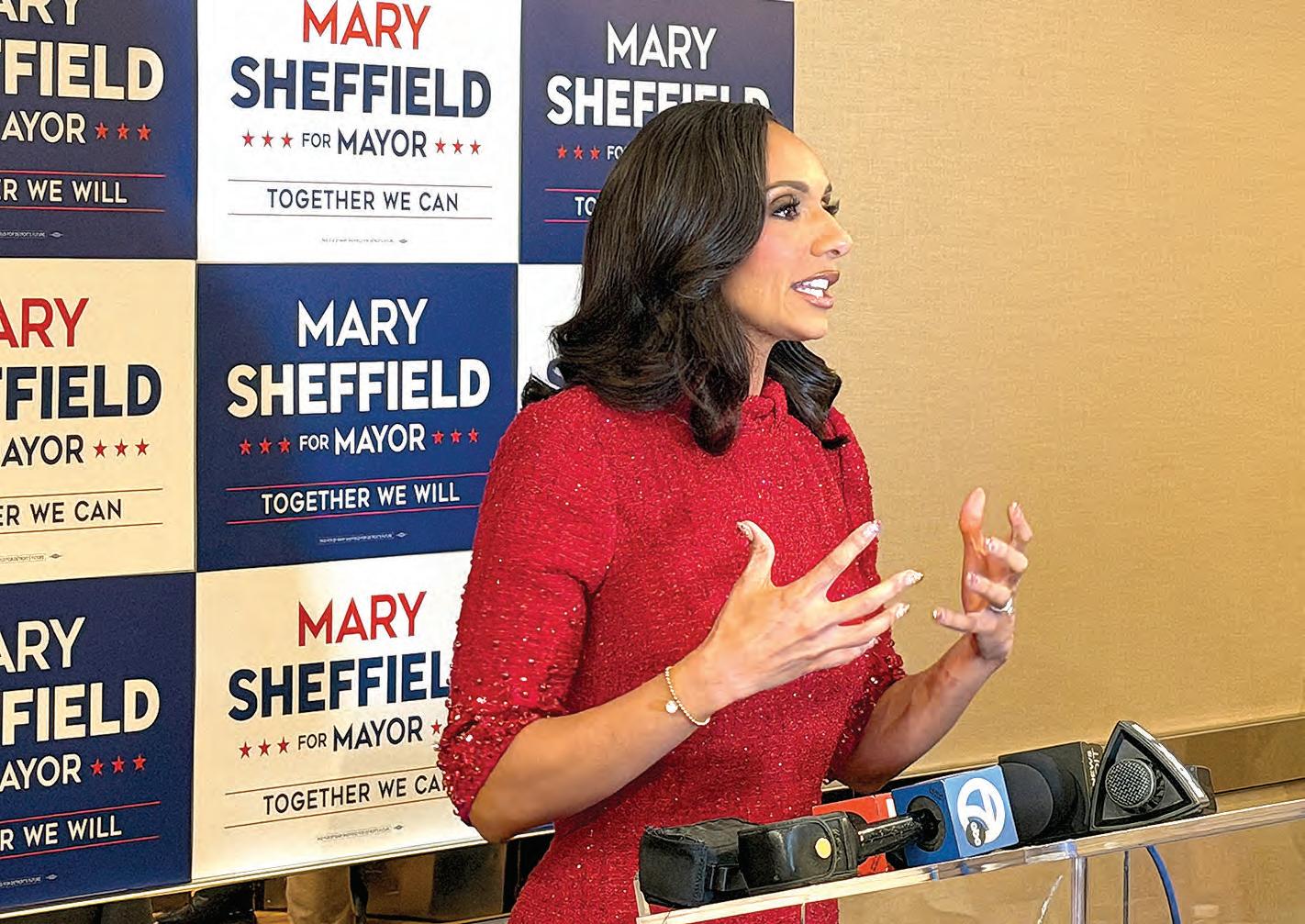
upward, a ban on abor tions could leave many women to choose a less safe route restoring ‘back alley’ and illegal abortion practices, including self-abortions. Moreover, African American women and women of color, who already have a long-storied history with access and inclusion in medi-
embraces. transforleadership as a approach that change the syscircumstancoperating Ivory “Transformationdoesn’t just do certhem view of and exdrive that because what create everyentire because






From page A-1
The process will include several key components designed to engage the community broadly and meaningfully. A citywide survey—both online and through on-the-ground canvassing— will reach residents in every Council district to capture information about their priorities for the new administration. Those insights will then be reviewed by transition committees composed of policy experts, civic leaders, and community advocates, including youth representatives. The committees will translate the survey results into actionable recommendations and collaborate with city departments to refine and vet proposed policies.
islature adopts it.
Increase school funding: Statutory changes to increase the School Aid Fund revenue by at least $3.6 billion and establish a permanent weighted funding formula based on student and community needs and universal preschool (0-3).
In addition, the transition team will organize community events across Detroit’s neighborhoods, where residents can see the administration’s developing priorities and offer their own ideas, stories, and solutions for how city government can better serve them. These conversations will help finalize a bold and actionable list of 100day priorities that Sheffield plans to begin implementing immediately upon taking office.
“This transition is about listening, learning, and building together. We’re
Reject censorship in history instruction: Encouraging Gov. Whitmer to ensure the goal for Michigan schools should be history instruction that is presented by professionals with the subject matter expertise,
giving every Detroiter a seat at the table as we shape the future of this city,” Sheffield said. “This is about partnership and ensuring Detroit’s progress is shared by everyone who calls this city home.”
As the council president prepares to take the city’s highest office, Rise
Beyond the scope of pro-choice versus prolife, the fight for reproductive choice is one of freedom. As Michigan officials work to ensure each woman who finds herself in the position to choose has access to care without the threat of legal action, many wonder
Higher Detroit will lead her transition.
• Conduct a citywide survey reaching residents in every Council district— both online and through on-theground canvassing—to capture real information about Detroiters’ own priorities.
The health committee recommends reviewing state licensure policies to address the barriers that Black psychologists face in obtaining licensure in Michigan.
can better serve them.
The Rise Higher Detroit transition effort will ultimately help Mayor-elect Sheffield assemble an administration of talented and passionate leaders ready to move Detroit forward.
Specific positions will be posted on the website periodically, but the transition is collecting resumes now to match Detroiters’ skills and experiences to upcoming roles in the administration.
No public or campaign dollars are being used to fund the activities of the Rise Higher Detroit transition committee.
Ensure equitable distribution of state health funds: Ensure all Michigan communities with a significant Black population receive adequate funds to address mental health issues.
• Convene transition committees, made up of policy experts, civic leaders, and youth and community advocates, to interpret survey results, translate them into actionable recommendations, and collaborate with city departments to vet and refine policy ideas. The committees will also focus on finalizing a bold and actionable list of 100-day priorities, which Mayor-elect Sheffield will begin implementing the very day she takes office.
The Mayor-elect and Detroit’s philanthropic community have collaborated to create a fund, the group said. The group is supported by the Community Foundation for Southeast Michigan and a variety of foundations and other civic institutions to fund transition efforts, including community engagement and talent acquisition.
So even in defeat, his story is a source of encouragement to the city. It says: the work of Detroit is not just downtown, not just in headlines or skyscrapers, not just in glittering redevelopment. It is in the corner grocery, the job training class, the house-rehab effort, the youth mentorship, and the faith-led neighborhood outreach. Rev. Kinloch’s leadership reminds us that this work needs renewing, and that it requires both vision and presence. Mayor-elect Sheffield recognizes that, too, and has promised to continue that work on day one.
to the neighborhoods. You double down on the food pantries, the job-training, the housing help, the youth intervention, the vision casting. You build on what you began in the race and turn it into ongoing power for good.
Detroit needs your voice and your presence as much now as ever. Your work reminds us that progress isn’t just adding units or building offices, but it’s making sure every Detroiter knows they belong.
Rev. Kinloch’s campaign was not simply an electoral loss, but a springboard. As Detroit watchers and participants, let us think about the ways we, too, can serve. Some may run for office, some may not—but all can act.
• Host community events across all neighborhoods where residents can see priorities clearly displayed and share their ideas, stories, and solutions for how the City government
Protecting Black voting rights: Urge state officials to remain vigilant in the fight against schemes to disenfranchise Michigan-
The release points residents to RiseHigherDetroit.com to sign up to stay up to date on future opportunities and submit a resume to join the transition team.
You can reach Sam at srobinson@ michronicle.com

people believe that they need to for themselves and others to live better lives.”
From page A-1
What’s more, the support he garnered during his campaign will surely inspire other leaders – faith leaders, nonprofit heads, community organizers, civic volunteers. Anyone who looks at Detroit and says, “I love this city,” can act on that love. The baton doesn’t pass only through elections. It passes through everyday commitments.
To Rev. Kinloch, we say: your service has been indispensable and your influence real. The campaign elevated issues that needed to be elevated. The base of support you built proves that Detroiters are ready for bold, inclusive leadership that listens. Your mission is far from over.
Now is the time to lean in and pick up where the campaign leaves off. You return
Rev. Kinloch’s run has made it plain that service does not stop at the ballot box. It begins in the community, and the campaign ends when the work does not. We look forward to watching and applauding what comes next: the community partnerships, the neighborhood improvements, the uplifted lives, and Detroit emerging where everyone has a chance to thrive.
To you, Rev. Kinloch: thank you. Your 27 years of faithful service have built trust. Your willingness to step into the public arena has expanded hope. The city is better because you showed up, and we know you will continue to show up. Because Detroit needs you.
partnership is such a milestone. Since its inception, the series has hosted influential leaders from across the political spectrum, as well as community advocates, business leaders, and industry experts. The forum’s candid discussions have helped shape policy in Michigan and beyond, creating a lasting impact on the way policy is approached, debated, and implemented. Now, with the support of the Detroit Auto Show, the program will take on even greater significance by blending the world of business and innovation with the civic-minded spirit that defines Pancakes & Politics.
Sam Klemet, Executive Director of the Detroit Auto Show, expressed excitement about the new collaboration, emphasizing how the partnership with Pancakes & Politics brings together two of Detroit’s most iconic platforms.
“Chancellor Ivery is a true transformational leader and an outstanding CEO, who is more than worthy of the CEO of the Year Award he just received, “ said Prof. James C. Mays, who teaches entrepreneurship and supply chain management at WCCCD’s Corporate College. “In his 27 years at WCCCD, Dr. Ivery has elevated WCCCD to become nationally recognized for excellence and innovation and preparing our students professionally and personally to do great things in the world.”
“The Detroit Auto Show is about more than just cars—it’s about community, innovation, and charting the future,” Klemet said. “By partnering with the Michigan Chronicle on Pancakes & Politics, we are able to bring important conversations to the forefront during one of the city’s most high-profile events. The auto industry is evolving rapidly, and the intersection of this industry with public policy, community building, and leadership development is more important than ever. This forum will allow us to address these pressing issues while
BLAC and a virtual audience in discussing the recommendations to support the Black community.
highlighting the critical role Detroit plays in shaping the future.”
As the global auto industry faces seismic changes, the opportunity to host Pancakes & Politics during the Detroit Auto Show will bring urgent questions to the table, especially those surrounding the future of mobility, technology, sustainability, and economic development. Leaders in the automotive industry, alongside policymakers and community stakeholders, will have the chance to tackle these challenges head-on, examining the opportunities that exist within this transformative moment for the industry.
BLAC is housed in the Michigan Department of Labor and Economic Opportunity. Members represent many professional backgrounds, including economics, law, public safety, health and wellness, arts and culture and media. They leverage their experiences and expertise to make recommendations to the governor on critical issues affecting the Black community.
To learn more about BLAC and this upcoming event, visit www.michigan.gov/BLAC.
But the partnership is truly about understanding how the decisions made at the intersection of business and government will impact the communities of Detroit and Michigan. The Pancakes & Politics forum will integrate discussions on policy, economic growth, community investment, and social equity alongside talks about the evolving auto industry. This creates a rare space where the big questions of industry transformation are examined with a focus on how they will affect the region’s most vulnerable communities. It’s a chance for both business and civic leaders to exchange ideas that will shape the future of Detroit’s automotive landscape and also guide its development as a global hub for innovation, sustainability, and economic opportunity. As the forum’s launch date draws
closer, details about the event’s program and speakers will be announced in the coming weeks. Organizers have promised that a wide range of thought leaders, policy makers, and industry executives will take part in the live event, contributing their perspectives and expertise on the evolving auto industry and the future of Detroit. The event will be a true fusion of Michigan’s rich automotive heritage with the modern challenges and opportunities facing the city and its residents today.
“This is the perfect way to kick off the 21st season of Pancakes & Politics,” said Jackson. “By hosting this live forum at the Detroit Auto Show, we’re not only honoring the legacy of Pancakes & Politics but also positioning it at the forefront of the critical conversations shaping our city’s future. We are proud to partner with the Detroit Auto Show and DADA to bring this unique forum to life and set the stage for another year of thought-provoking and action-oriented dialogues.”
As the city continues to embrace its role as a global leader in the automotive industry, this partnership offers a unique opportunity to bridge the gap between the world of business and the needs of the community. The integration of Pancakes & Politics into the Detroit Auto Show experience is a statement about the relevance of civic engagement, the importance of leadership in the public and private sectors, and the ongoing transformation of Detroit as a city of innovation and opportunity.

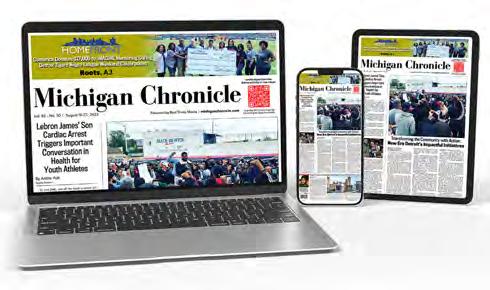

A3 | November 12-18, 2025
COMMUNITY VOICES:
By Antonice Strickland VP OF PR & BUSINESS DEVELOPMENT, 98FORWARD
When Detroit made history by electing Council President Mary Sheffield as its first woman mayor, it was more than a political milestone. It was a defining moment for leadership, representation, and power.
But behind that historic victory was another story worth telling: A locally based, Black-owned PR agency led the communications that helped make it happen.
That agency is 98Forward, Michigan’s longest-standing Black-owned, woman-led, full-service PR, marketing, and strategic communications firm, owned by Marilyn Horn.

For nearly 30 years, we’ve operated in boardrooms, briefing rooms, and newsrooms, where our presence was questioned, our expertise underestimated, and our firm labeled “niche” instead of fully capable. Yet through it all, we’ve continued to lead, to deliver, and to build a legacy of impact that extends far beyond Detroit.
For Black and Brown professionals in public relations and communications, the idea that we must be “twice as good to get half as far” isn’t a cliché — it’s a reality. Many of us have worked twice as hard throughout our careers and in spaces that still underestimate our value. And yet, we’re still here. Still building. Still rising.
At 98Forward — formerly known as Berg Muirhead & Associates, which was founded by PRSA Hall of Fame Inductee and PR legend Georgella Muirhead and legendary press secretary to Detroit Mayor Coleman A. Young and Governor William Milliken, Bob Berg — we’ve guided presidential visits, led civic and corporate campaigns, managed crises, and built strategies that influence policy and public opinion. Our work spans sectors from business and government to philanthropy, nonprofit, and hospitality. We are rooted locally, but we move nationally and globally.
So when journalist Roland Martin posted in 2023 that he wanted to see a “major Black-owned PR firm that doesn’t just focus on entertainment,” his words struck a chord. Not in frustration, but in reflection. Because while his sentiment was valid, the omission was revealing.
Full-service Black-owned PR firms do exist outside of entertainment. Many have been quietly operating at scale, leading campaigns with the same strategic sophistication as their local and national counterparts, just without the same spotlight.
The public relations industry is far from a niche space. In fact, the U.S. PR market is valued at roughly $24.5 billion as of 2025, according to IBISWorld. It’s a sprawling, competitive industry that shapes public perception, influences markets, and drives major business outcomes. Yet, within this multibillion-dollar sector, Black-owned PR firms remain underrepre-
See 98FORWARD Page A-4

By Jenise Williams GUEST COLUMNIST
What started as me accompanying my sister on a work trip quickly turned into one of the most profound experiences of the year, as I got to witness Detroit’s creative force take center stage in the City of Lights during Art Basel Paris 2025.
Art Basel has become a global phenomenon, hosting fairs in Miami, Hong Kong, Qatar, and Paris. In 2024, I had the privilege of traveling to Art Basel Miami with the Detroit Institute of Arts’ (DIA) Friends of African and African American Art, where I experienced the incredible range of artistic mediums and styles. It brought together artists, collectors, and art lovers from around the world. But this October, Paris offered something uniquely special: Detroit wasn’t just attending – we were commanding attention.
Detroit Salon, co-led by Omar Blaik with curatorial direction from Laura Mott (Chief Curator at Cranbrook Art Museum) and Greg Bryla (Program Manager at the DIA), helped so many others bring the “Paris of the West” to France. The exhibitions featured over 20 Detroit artists across three phenomenal exhibitions.
The moment I walked into the Palais de Tokyo exhibition (one of three Detroit exhibitions during the week), I felt an overwhelming sense of pride. This wasn’t just art on display – this was Detroit’s story, our resilience, our excellence, and our undeniable place in the global conversation.
The exhibitions – “A Blueprint of Resonance: Building Detroit’s Artistic Future,” “Domestic Dialogues: The Art of Living in Detroit,” and “Stitched into History” – showcased what those of us in Detroit have always known: our city’s artistic legacy runs deep, rooted in the Black Arts Movement of the 1960s, and continues to flourish today. Detroit has long been a city that creates culture rather than simply consuming it, and these exhibitions proved that to an international audience.
What made this moment even more meaningful for me personally was seeing three artists whose work the Detroit Institute of Arts’ Founders Junior Council (FJC) acquired through our African American Art Endowment fund featured prominently between the exhibitions: Tylonn Sawyer, Carole Harris, and Tiff Massey.
As a member of the Founders Junior Council, I’ve witnessed firsthand how intentional investment in Black artists creates a ripple effect. When we launched our African American Art Endowment fund, we were ensuring that Detroit’s diverse creative voices would be preserved and celebrated for generations to come by acquiring pieces for the DIA’s permanent collection.
Seeing work from some of the artists the FJC acquired work from in Paris, knowing that institutions and collectors from around the world were experiencing what we’ve known all along, filled me with indescribable pride. This is what happens when we invest in our own. This is what happens when we refuse to wait for outside validation and instead create the platforms and
opportunities ourselves.
Beyond the visual art, Detroit Salon brought the full Detroit arts experience to Paris, which for Motown, also included music. The programming included parties that showcased Detroit talent from DJs Kesswa and SkyJetta to the Detroit Public Schools Community Districts’ All-City Marching Band. Being from a city that’s provided the soundtrack to movements and life’s milestones, it was only right to import our distinct sound for the occasion.
There’s an energy and momentum within Detroit’s art scene right now that’s undeniable. It’s not new – it’s been building for decades – but it feels like we’re finally receiving the recognition we deserve. Our artists aren’t just creating beautiful work; they’re telling stories that need to be told, challenging narratives that need to be challenged, and representing communities that have too often been overlooked.
The work doesn’t stop here. As the first Black woman to be elected president of the Detroit Institute of Arts’ Founders Junior Council in our 60-year history, I know that we have a responsibility to continue this momentum. We must keep acquiring work from Detroit artists, keep showing up at local galleries and exhibitions, keep supporting the cultural institutions that make our city special, and keep telling the world that Detroit’s artistic excellence is not just our past or our future – it’s our present.
For those inspired by DetroitSalon’s success in Paris, there are countless ways to support Detroit’s thriving arts scene at home. Visit the DIA and become a member of auxiliary groups like the Founders Junior Council or Friends of African and African American Art. Attend exhibitions at the Museum of Contemporary Art Detroit, the Charles H. Wright Museum of African American History, Cranbrook Art Museum, and local galleries throughout the city. Purchase work from Detroit artists, attend their shows, and share their stories. Detroit’s art scene is flourishing not by accident, but because of deliberate community investment and support. Each of us has a role to play in ensuring this momentum continues.
Standing in Paris, surrounded by Detroit art and Detroit people, I realized we don’t need the world to validate us. We know what we have. And as Detroit said “What up doe?” to Paris receiving a resounding “bonjour” in return, one thing became clear: this wasn’t just our debut at Art Basel Paris, it was our hello to the global art world.
Jenise Williams currently serves as the President of the Detroit Institute of Arts Founders Junior Council Board of Directors. She is youngest person and the first Black woman to be president of its board.
By Jeremy Allen
EXECUTIVE EDITOR
In a ceremony steeped in recognition and respect, the legacy of one of Detroit’s most influential athletic figures received renewed emphasis this week. The offices of the Michigan House of Representatives issued a formal legislative tribute to David L. Holmes for his transformative career as athletic director and track coach at Wayne State University (WSU), while the school’s press strengthened its commitment to one of his most lasting legacies – a newly released biography chronicling his work.
State Rep. Joe Tate presented the tribute to Wayne State University Press Director Stephanie Williams in recognition of the press’s publication of the book Coach of Champions: D.L. Holmes and the Making of Detroit’s Track Stars, authored by Keith D. Wunderlich and David L. Holmes Jr. The book, which came out in April 2025, weaves archived interviews of Holmes’s athletes with historically informed narratives of the Wayne State teams. Holmes, recruited in 1917 to launch the athletic program at Detroit Junior College (which would become Wayne State University), served as athletic director and coach from 1917 to 1958. Under his leadership, the institution saw multiple sports flourish, including track & field, cross-country, football, and basketball. According to the Michigan Sports Hall of Fame, Holmes coached
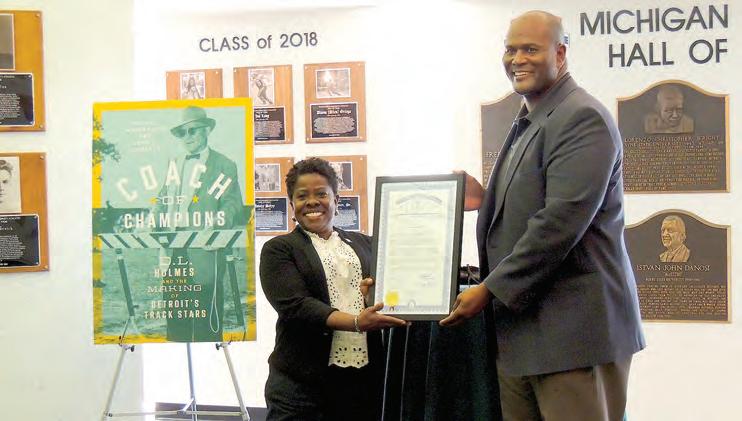
football 1918-28, basketball 1918-28, and served as athletic director for 41 years.
Among his many achievements: three Olympians, nine All-Americans (and several national and world record-holders) emerged from his programs. A Wayne State catalog describes how Holmes guided thousands of athletes — Black, Jewish, Eastern European, and others — at a time when racial and religious discrimination was part of the fabric of society. Notably, Holmes made history in 1929 by appointing the university’s first Black team captain, and one of his athletes would go on to become Michigan’s first
Black athletic director. In the legislative tribute, the State of Michigan commended Wayne State University Press “for its outstanding contribution in preserving and honoring the remarkable legacy of Coach David L. Holmes and the former Wayne State University Track & Field athletes he guided to greatness.” The tribute cited Holmes’s induction into the Michigan Sports Hall of Fame in 1975 and as a charter inductee in the Wayne State Sports Hall of Fame in 1976. The authors of the book offer an intimate lens into Holmes’ campus era, chron-
icling this Detroit pivot point: from Detroit Junior College to Wayne State University, Holmes built an inclusive athletic program that welcomed athletes of diverse backgrounds long before diversity and inclusion became watchwords in collegiate sport. The media program The Metro sums it up: “In a time when segregation in sports was the norm, Holmes coached athletes of all races — a radical act.”
The significance of the publication and the legislative recognition is two-fold: it elevates Holmes’s story in Detroit’s sports heritage, and it reinforces the claim that sports within historically underserved communities can—and should—be about more than wins and losses.
As one example of his success, under Holmes’s direction, the track & field teams were crowned co-champions in 1936 and earned President’s Athletic Conference championships in 1956 and 1957. (Details of the football and basketball records show more variable team performance, but the broader legacy is in development, inclusion, and athlete advancement.) The initial press release noted the book’s highlight of “three Olympians, nine All-Americans, and various athletes that held national and world records.”
The Wayne State University Press catalog further describes the challenge Holmes faced: training facilities and equipment
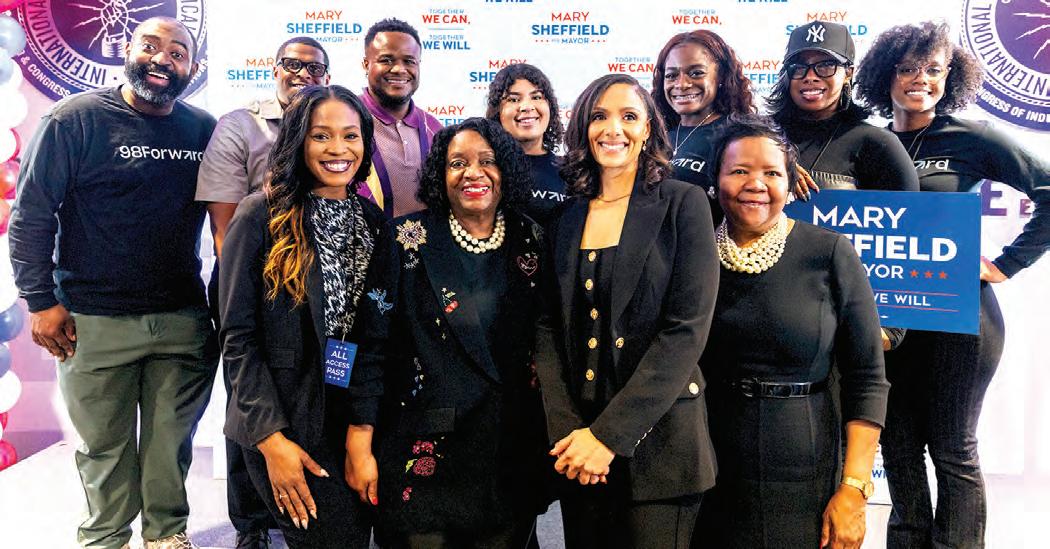
sented, too often viewed as community specialists instead of strategic partners. The truth is, we are not side players in a niche market. We are leaders in a national industry — and it’s time the industry began treating us that way.
Too often, Black-owned firms are brought in late, when diversity becomes a checkbox or when community trust is suddenly and rapidly required. But the best work happens when relationships are built before the crisis, before the campaign, before the RFP.
This can either be a foundational strategic practice, or a hard lesson. To quote our co-founders: “The best time to make a friend is before you need one.”
That wisdom applies to our industry now more than ever. Strategic communications must be rooted in trust and built on genuine partnership, not convenience. When corporations, philanthropic institutions and government agencies engage not only Black-owned PR firms but local PR firms early and equitably, the results are more authentic and they’re more effective.
It’s time to recalibrate how the industry views and values Black-owned PR agencies. We are not “alternatives.” We are innovators, thought leaders, and strategic powerhouses. We bring cultural fluency, narrative intelligence, outthe-box creativity, and community trust — assets that global firms often spend millions trying to replicate.
And in Detroit, we just proved it.
Mary Sheffield’s historic win was powered by strategy, storytelling, and community connection. A Black-owned PR agency helped her make history and,
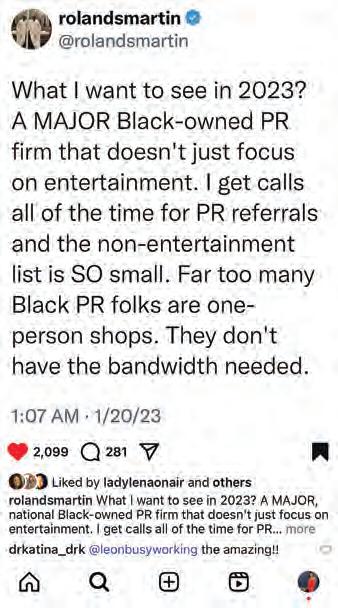
in doing so, we made a point that resonates nationally: Representation in leadership matters just as much as representation in strategy.
To my colleagues across industries, in media, philanthropy, business, and government, this is your call to action. Find a partner before you need one. Build trust, share opportunities, and recognize the capacity that already exists in this field.
To my peers in PR, especially Black and Brown professionals building firms across the country: let’s connect, collaborate, and scale together. The next chapter of this industry won’t be written in silos, but in shared strategy and



collective strength.
And to Roland Martin, whose advocacy and truth-telling I deeply respect, we are that Black-owned firm, and we do this work. From entertainment, government, nonprofits, events, and everything in-between. I extend this message with clarity and invitation: We are here. Let’s work together to move this conversation, and this industry, forward.
Because the point isn’t just that we deserve a seat at the table. It’s that we’ve already built the table and proven we can deliver.
Detroit has always been a city of firsts; a place that redefines what’s possible. And as we continue to rise, we’re showing the world what happens when excellence, equity, and execution align.
We’ve earned it. We’ve built it. And, when given the opportunity, we rise, we lead, and we get it done.
Antonice J. Strickland is the Vice President of Public Relations and Business Development at 98Forward. She is an award-winning public relations strategist with nearly 15 years of experience spanning politics, government, nonprofit, entertainment, and corporate sectors.
Antonice has led local and national campaigns and secured coverage in top-tier outlets nationally. She holds a Master of Professional Studies in Public Relations and Corporate Communications from Georgetown University and a Bachelor of Arts in Journalism from Michigan State University.
She currently serves as President-Elect of Public Relations Society of America Detroit, is a Committee Member of The Recording Academy, and formerly served as President of the National Black Public Relations Society, Washington, D.C. Chapter.
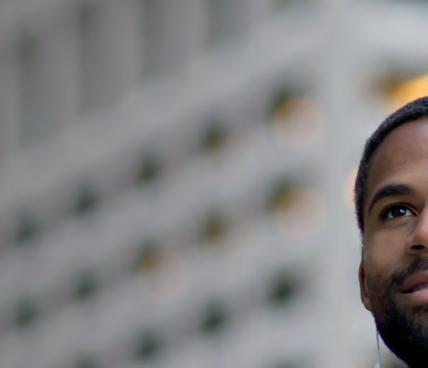
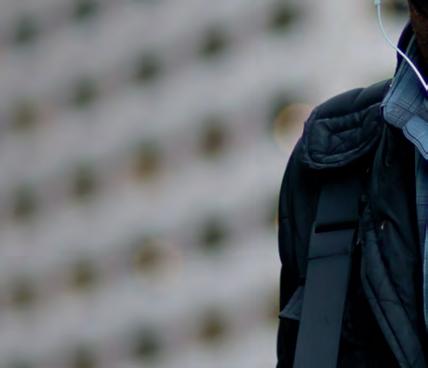
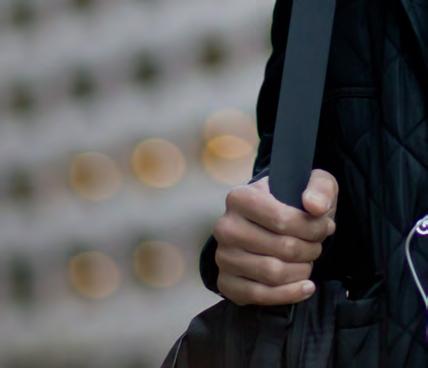
From page A-3
were outdated, yet his teams achieved greatness. “Throughout his forty-one years … he welcomed thousands of athletes — Black, Jewish, Eastern-European, and others … coaching many to become Olympians, world record holders, and national and AAU champions.”
Director Stephanie Williams accepted the tribute on behalf of the Press and emphasized its commitment to telling stories that matter for Detroit and beyond. Author Keith D. Wunderlich, Holmes’s grandson and himself a former sprinter, brings personal insight to the narrative. In a book talk held in April at the Detroit Historical Museum, the authors laid out Holmes’s career milestones and the personal stories of his athletes.
What stands out in Holmes’s story is the intersection of sport, social progress, and mentorship. He not only coached top-tier athletes—three Olympians and multiple record-holders—but also challenged the status quo of racial and religious exclusion. In 1929, his decision to appoint the first Black captain at Wayne was quietly groundbreaking, setting the stage for Black leadership in Michigan athletics. The Wayne State catalog even names one of his protégés, Leroy Dues, who became Michigan’s first Black athletic director.
In the broader Detroit sports landscape, the book Coach of Champions arrives at a moment when institutions are re-examining histories of inclusion and excellence. It offers Detroit readers, Wayne State alumni, and sports historians a long-overdue acknowledgement of Holmes’s role in shaping Detroit’s track stars.
For the athletes themselves, Holmes’s legacy remains personal. Former sprinter and book narrator Tom Adams (a former Wayne State Hall of Famer) appears in the interviews. The catalog states: “This uplifting account captures D.L.’s uncanny ability to discover and nurture hidden talent and the motivation he inspired in scores of athletes … including several inductees of Wayne State’s Hall of Fame like Tom Adams and Leroy Dues.”
Beyond the statistics, the most enduring part of Holmes’s legacy is the example he set: that regardless of race, faith, or background, an athlete could find opportunity, mentorship, and belief. Holmes’s philosophical imprint extended to inventing and improving training equipment, designing tools for his athletes, and contributing to coaching literature and Olympic analysis. As one tribute noted, “His legacy endures as a symbol of excellence, equity, and ingenuity in athletics.”
As Michigan’s sports institutions face the challenge of preserving history—and contextualizing it—the collaborative recognition by the legislature and Wayne State University Press makes clear that Holmes’s story belongs not just to Wayne State or Detroit, but to the broader narrative of American athletics.
For those seeking the book, Coach of Champions: D.L. Holmes and the Making of Detroit’s Track Stars is available through Wayne State University Press and major outlets such as Amazon. The joint publication by the institution’s press and Holmes’s family ensures the authenticity of the story.

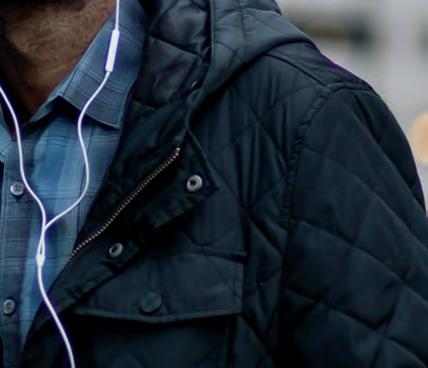


S:10"
A5 | November 12-18, 2025
By Anthony O. Kellum
WRITER
CONTRIBUTING
In America, a home is not simply a place to live, it is a statement of value. It reflects how society measures worth, stability, and belonging. Yet, for far too many Black homeowners, that value is discounted the moment the address is entered into a database.

Homes in majority-Black neighborhoods are routinely undervalued, even when comparable in structure, square footage, and amenities to those in white neighborhoods. The Brookings Institution found that homes in majority-Black areas are appraised at an average of $48,000 less than similar homes in non-Black neighborhoods, a cumulative loss exceeding $156 billion nationwide. That figure represents more than lost dollars. It is the extraction of equity, the quiet theft of intergenerational wealth, and the economic marginalization of entire communities. The Historical Architecture of Devaluation
To understand the present disparity, one must look at how property valuation itself evolved.
During the New Deal era, federal housing maps color-coded neighborhoods by “risk.” Predominantly Black communities were outlined in red “hazardous” and denied mortgage capital. Over time, those same maps shaped urban investment patterns, steering private capital away while concentrating poverty and disinvestment.
Even as redlining was outlawed, its logic persisted. Appraisers continued to use “comparable sales” drawn from racially homogeneous neighborhoods, embedding bias into the very algorithm of valuation. Thus, devaluation is not incidental it is inherited. The same institutional frameworks that once banned Black buyers from neighborhoods now systematically reduce the value of the neighborhoods they built. How Undervaluation Shapes the Black Wealth Gap
Appraisal bias does not end at closing; it compounds over time. Lower valuations limit a homeowner’s ability to refinance, invest in home improvements, or leverage equity to start a business or fund education. When the time comes to sell, the return is smaller, curbing the ability to move upward or assist the next generation in purchasing their own property.
This is how the wealth gap reproduces itself. According to the Center for American Progress, even after adjusting for education and income, Black families hold roughly one-fifth of the median wealth of white families. Much of that gap is rooted in home equity or the absence of it. The tragedy is not that Black families fail to buy homes, but that the market fails to recognize the full value of what they own.
The Psychology of Place
Appraisal disparity is not only economic; it is psychological. It signals to homeowners that their neighborhoods, their lives, histories, and aspirations are worth less. This message erodes confidence, fuels disinvestment, and distorts public perception. Over time, it becomes a feedback loop: undervaluation discourages improvement, which in turn reinforces the perception of low worth. In this way, property becomes a mirror of societal bias not an expression of intrinsic value, but of external prejudice. The price tag attached to a home becomes a proxy for how much a community is respected.
Reclaiming the True Value of Black Neighborhoods 1. Reforming the Appraisal Process Federal agencies and professional associations must enforce stronger oversight and transparency. Random audits of appraisal reports, algorithmic bias
See WORTH APPRAISAL GAPS Page A-6
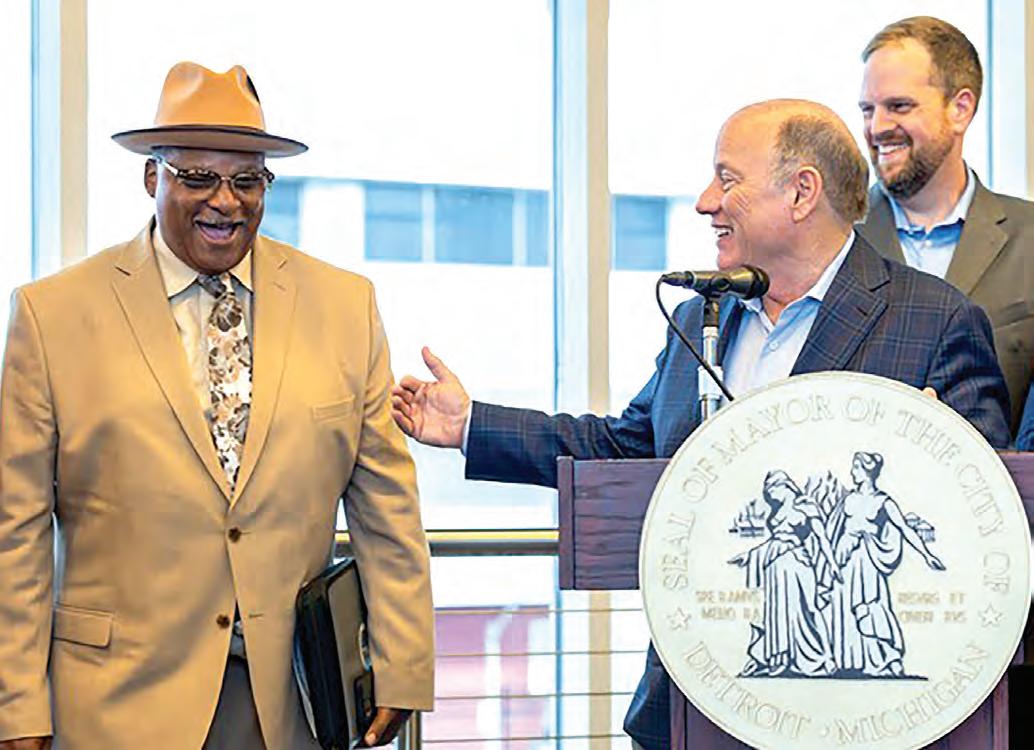
Mayor Mike Duggan shares a laugh with the President of Amalgamated Transit Union Local 26, Schetrone Collier, at the announcement of ATU’s new contract with the city.
By Jeremy Allen EXECUTIVE EDITOR
Detroit’s bus drivers are set to see the largest wage increase in more than a decade under a new agreement between the City of Detroit and the Amalgamated Transit Union (ATU) Local 26. The contract, which was ratified by an overwhelming 98% of voting union members, promises an immediate $6 per hour wage increase once approved by City Council — a move city officials say will make Detroit more competitive in retaining and attracting transit operators.
Mayor Mike Duggan joined ATU President Schetrone Collier and Executive Director of Transit Robert Cramer in announcing the agreement, calling it a long-overdue step toward pay equity for the city’s bus operators. The new pay structure will bring starting and maximum wages for Detroit Department of Transportation (DDOT) drivers in line with those offered by the Suburban Mobility Authority for Regional Transportation (SMART), a neighboring system that for years has outpaced Detroit in driver compensation.
Under the proposed deal, DDOT’s starting hourly pay will rise from $19.56 to $25.38, while the maximum rate will increase from $26.18 to $32.18. These figures mark a significant leap forward for more than 500 DDOT operators represented by ATU Local 26 — workers who have long advocated for wages that reflect the demands and importance of their roles in Detroit’s public transit network.
“Over the past 12 years, we have steadily increased the amount DDOT drivers are paid but continue to lose a lot of our drivers to SMART because it traditionally has paid more,” said Mayor Duggan. “With this new contract, for the first time, bus drivers can take home more if they work for DDOT and meet their performance marks.”
The new wage structure still trails
slightly behind other regional peers, but it closes much of the long-standing gap. Currently, SMART drivers earn between $25.87 and $32.34 per hour, while those in Lansing make $26.44 to $33.05. Ann Arbor transit operators remain the highest paid in the state, with wages starting at $28.09 and capping at $33.05 per hour. Even with these differences, the proposed Detroit increase represents a meaningful improvement — not just in pay, but in the city’s ability to compete for skilled operators amid a tightening labor market.
Officials say the city’s investment in its bus drivers is about more than just wages. A new system of performance incentives will reward employees for strong attendance and safety records, offering opportunities to earn even more than drivers at neighboring transit agencies. These quarterly bonuses, which continue from previous contracts and expand under the new one, aim to improve service reliability and passenger safety.
Under the agreement, attendance incentives will be provided to drivers who have no more than one unplanned absence per quarter. Safety bonuses will be awarded to those with no preventable accidents within the same period. Together, these measures seek to strengthen performance and ensure consistent service for the thousands of Detroiters who depend on DDOT buses each day.
Additional provisions in the contract include an annual cost-of-living increase every July 1, ensuring that wages keep pace with inflation and ongoing economic changes. Mayor Duggan credited Human Resources Director Denise Starr for her role in negotiating the new deal and helping the city and union reach a consensus. He also expressed optimism that the contract will stabilize DDOT’s workforce and improve service reliability for Detroit residents.
The sentiment was echoed by ATU Local 26 President Schetrone Collier, who said the agreement represents both progress for workers and a win for the broader community. “The passing of the ATU Local 26’s new contract represents progress not only for our members, but for the entire community that depends on safe, reliable and efficient transportation,” said Collier. “We thank our riders and supports for standing with us as we work toward a fair and sustainable transit system for all.”
The contract will be submitted to the Detroit City Council in November and is expected to take effect immediately upon approval. City Council President and Mayor-elect Mary Sheffield expressed strong support for the proposal, emphasizing that improved wages are essential to improving bus service across Detroit.
“One of our largest hurdles in overcoming long wait times and improving reliability within our transportation system has been retaining our DDOT drivers,” Sheffield said. “This wage increase will help us keep skilled drivers on the road and raise our service standards, while also providing competitive pay and incentives to enhance both service and safety on our streets. This increase signals to our drivers that we value their service and are committed to investing in the people who keep Detroit moving.”
City officials expect the cost of the wage increase to be partially offset by new revenue from Governor Gretchen Whitmer’s recently approved transportation funding bill. Additional savings are anticipated through reduced training costs, as higher pay should reduce turnover and limit the number of new hires leaving DDOT for higher-paying opportunities elsewhere.
For years, Detroit’s transit system has struggled with driver shortages that have led to reduced service frequency,
By Ebony JJ Curry SENIOR REPORTER
The State of Michigan recently committed $270 million to expand Rx Kids to additional Michigan communities over the next three years.
The City of Ypsilanti, in partnership with Rx Kids, announced that the program will launch there on December 1, 2025. Families will receive $1,500 during pregnancy and $500 a month during the baby’s first six months of life.
“Rx Kids is a bold investment in our families and our future,” said Ypsilanti Mayor Nicole Brown. “We’re proud to bring this program to the City of Ypsilanti and ensure every child has the opportunity to thrive from day one.”
No conditions. No work requirements. No eligibility tests beyond residency and a confirmed pregnancy or newborn.
“This means a lot to me,” said Representative Jimmie Wilson Jr. “Ypsilanti is my hometown, and I’m proud to help bring Rx Kids to the families I serve. This program is more than policy—it’s a commitment to equity, dignity, and opportunity for every child and every parent in our community.”
Enrollment opens December 1, 2025, for
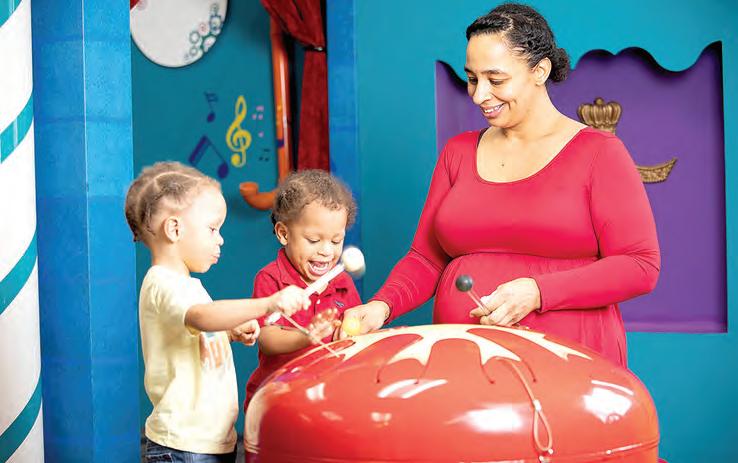
pregnant women and families with infants born on or after that date who reside in the City of Ypsilanti. RX Kids has been reshaping what maternal and infant support looks like in Michigan, rooted in the belief that every child deserves a healthy start and every parent deserves stability during those first, often overwhelming months. The program began in Flint in 2024 as part of the Michigan State University Pediatric Public Health Initiative led by Dr. Mona Hanna-Attisha. Flint was chosen with intention. Families there had experienced years of crisis, health inequities, and economic strain. Rx Kids served as a direct response to the reality that families are often ex-
pected to navigate pregnancy and early childcare with limited resources and high expenses during one of the most critical developmental
The
“Across
director of Rx Kids and associate dean for public health at Michigan State University. Families in the Flint program received $1,500 during pregnancy and $500 a month for the first year of their child’s life. The program is not set up to monitor or dictate how families should spend the money. The purpose of the program is to give families breathing room — the ability to afford groceries, secure diapers and formula, maintain housing, pay for transportation, or simply cover the unexpected.
Over time, the results began to reflect a familiar truth long voiced by communities: when families have what they need, children thrive.
“This success is exactly why we’re so ex-
cited to bring the program to the City of Ypsilanti and many more communities across the state,” said Dr. Mona. “Every baby deserves a strong start, and every family deserves the support to make that possible.”
More than 3,800 families in Flint have received support, totaling about $16 million. The stories coming from parents reflected reduced stress, healthier pregnancies, and a stronger start for newborns. The program’s measurable outcomes and lived experiences helped advance a statewide conversation about maternal and infant health, economic security, and public responsibility.
“Right now, starting a family is more expensive than ever, which is why the Rx Kids program is such a game-changer — helping new parents afford groceries, rent, and all the supplies it takes to care for their baby,” said State Senator Jeff Irwin (D-Ann Arbor). “Both the data and stories from those who’ve benefited from the program firsthand show us this program truly works, and works well, which is why my Senate Democratic colleagues and I were proud to secure funds in past budget cycles for its expansion.”
Wayne County is also moving forward with broader expansion efforts.
County Executive Warren C. Evans recently launched the county’s partnership with Rx Kids to help extend the program’s mission of supporting pregnant moms and infants across more Michigan communities, such as River Rouge, Hamtramck, Highland Park, Inkster, Melvindale, and Dearborn.
The county has committed $7.5 million to support the program’s rollout in select Wayne County communities, with additional support coming from state Temporary Assistance for Needy Families (TANF) funds.
“Every baby deserves a strong start. When we invest in moms and babies, we give families hope, support, and a chance to build a better future,” said Warren C. Evans.
Rx Kids is a program of the Michigan State University Pediatric Public Health Initiative, in collaboration with Poverty Solutions at the University of Michigan, and administered by GiveDirectly. The expansion to Ypsilanti is made possible through the support of the State of Michigan, the City of Ypsilanti, Song Foundation, Ann Arbor Area Community Foundation, and Old National Bank.
“Rx Kids is a powerful example of what’s possible when the public and private sectors come together to meet urgent community needs,” said Linh Song of The Song Foundation. “Local philanthropy has stepped up as a steady, values-driven partner—one that isn’t swayed by political cycles or budget battles. No matter the moment, philanthropy can and should remain committed to the long game: supporting families, strengthening communities, and investing in the future.”
For more information and to apply, visit RxKids.org.
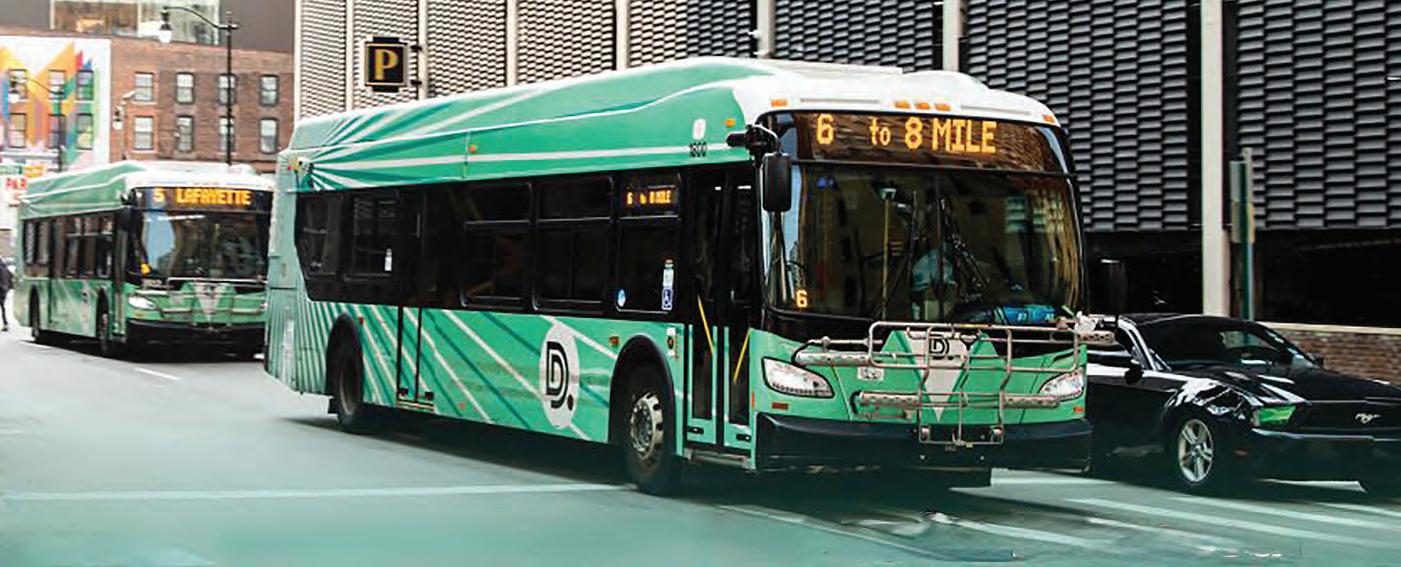
missed routes, and long wait times for riders. The new contract aims to reverse those trends by making DDOT a more attractive and stable employer in an increasingly competitive market for bus operators. City leaders hope that higher pay and improved incentives will lead to better recruitment and retention — and, in turn, better service reliability.
Executive Director of Transit Robert Cramer said the agreement is a reflection of the city’s ongoing commitment to the workers who form the backbone of Detroit’s public transportation system.
testing, and community participation in valuation standards are essential. A home’s worth should reflect its features not the race of its neighbors.
2. Building Black Appraisal Power
Representation matters. Increasing the number of Black appraisers and valuation professionals can disrupt the cycle of inherited bias. Training and certifying new appraisers from historically Black colleges and universities (HBCUs) or community pipelines is a direct form of economic resistance.
3. Leveraging Policy and Community Action
Local governments can incentivize reinvestment in undervalued communities through tax credits, equity-based lending, and fair-appraisal programs. Community development financial institutions (CDFIs) and mission-driven lenders can bridge gaps left by traditional finance.

4. Educating and Empowering Homeowners Black homeowners must be informed
“DDOT’s operators are the public face of our transit system - dedicated professionals who take pride in safely connecting residents to the places and people that matter most,” Cramer said. “This new contract represents a continued investment by the Mayor and City Council reflective of their essential role and supporting rewarding and sustaining careers.”
The announcement of the ratified contract marks a milestone in Detroit’s efforts to strengthen its public transportation infrastructure and to ensure that the people operating it are fairly compensated for their work. For riders, it signals the city’s renewed focus on reliability and safety.
of their rights and empowered to challenge low appraisals. Knowing how to request a reconsideration of value, submit comparables, or file fair housing complaints transforms passive frustration into active agency.
The Deeper Truth
When we talk about home value, we are really talking about human value. The devaluation of Black neighborhoods is not just an economic oversight it is a moral indictment. It reveals how racism can shape markets just as surely as policy can..
Because Property is Power only when its value is honored. When every home in every neighborhood is appraised not by prejudice, but by potential.
The true wealth of a community is not just in its property lines it is in its people. And until that truth is reflected in our valuations, America’s balance sheet will remain incomplete.
Property is Power! is a movement to promote home and community ownership. Studies indicate homeownership leads to higher graduation rates, family wealth, and community involvement.
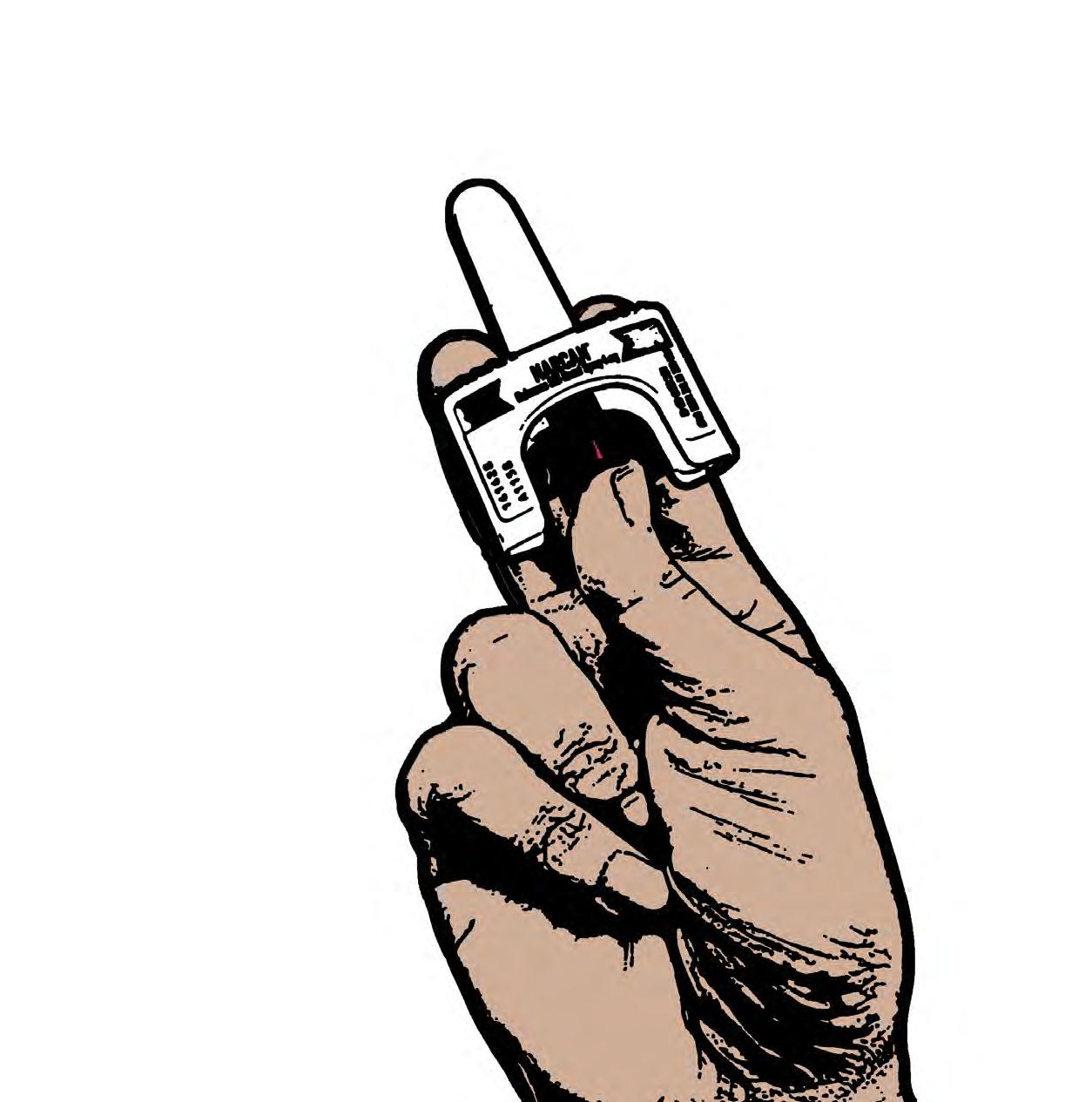
For drivers, it represents recognition of the challenges they face daily on Detroit’s streets — and the value they bring to the city’s residents.
The boost in pay, paired with performance-based bonuses and regular cost-ofliving adjustments, gives DDOT drivers a clearer path toward economic stability. And for a department that has long been challenged by driver turnover, the contract may finally provide the stability needed to deliver consistent, high-quality service.
As the city awaits final approval from the Council, both union leadership and city officials are optimistic that the contract will mark a turning point for Detroit’s transit system — one built on fair wages, accountability, and shared commitment to serving the public.


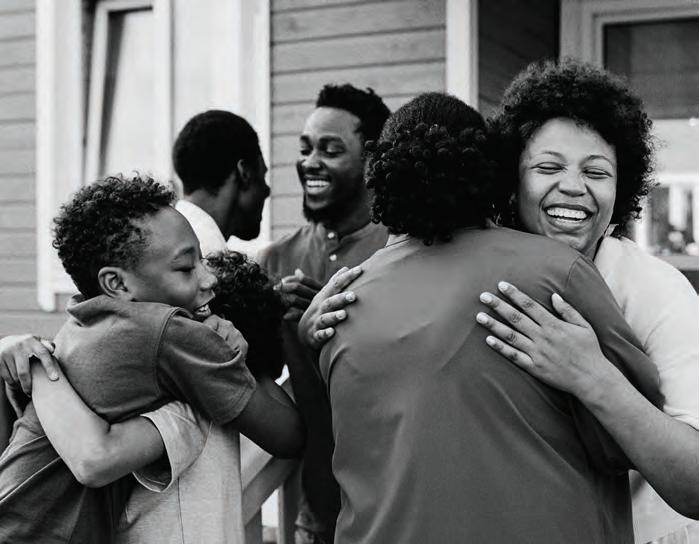
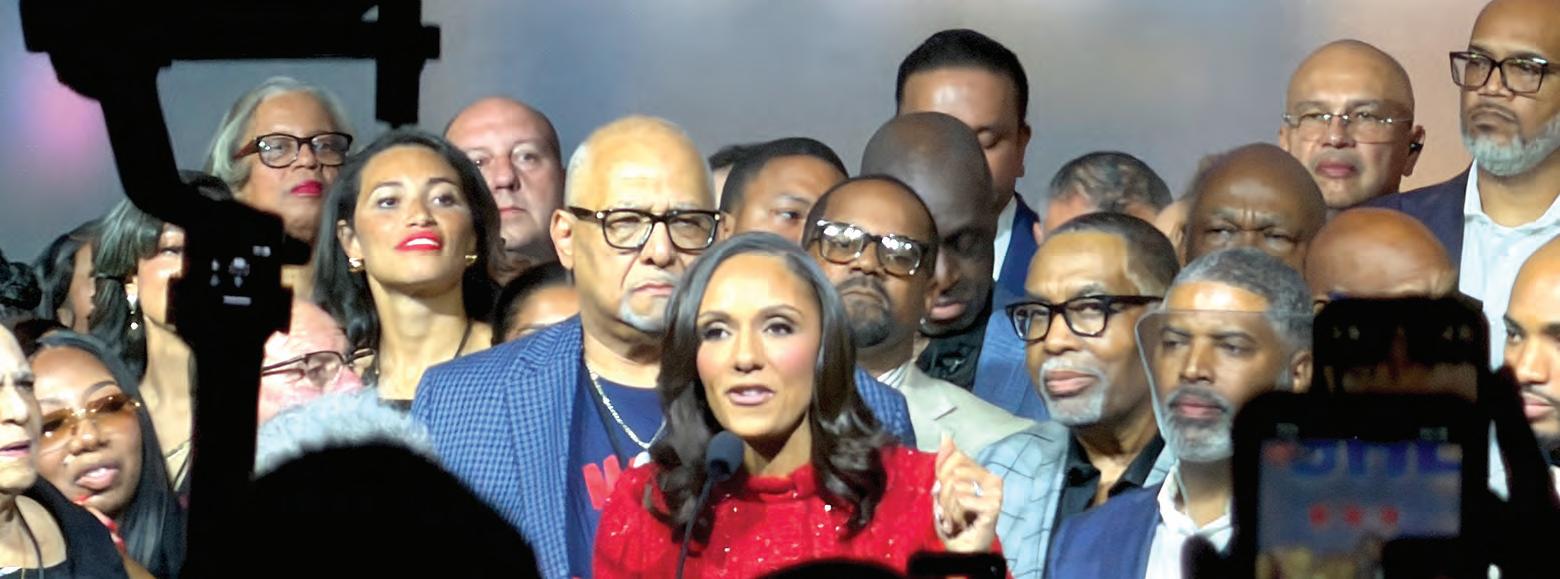
By Sam Robinson SENIOR REPORTER
High-profile Democrats from Detroit and across the state came to the MGM Detroit on Tuesday night, Nov. 4, to celebrate Detroit Mayor-elect Mary Sheffield’s landslide win.
Her 77% victory over Triumph pastor the Rev. Solomon Kinloch is a historic margin in a Detroit mayor’s race, her campaign said. She called the victory a mandate from voters.
Business owners, rappers, and politicians joined supporters at the watch party Sheffield’s campaign threw Tuesday night at the MGM Detroit.
Political figures included the chair of the Michigan state party, two Democrats running for Michigan governor and U.S. Senate, a Michigan Supreme Court justice, a suburban county executive, plus candidates for secretary of state and attorney general.
Sheffield invited supporters and the media to watch her vote in Lafayette Park, where national pundit and author Michael Eric Dyson said Sheffield is among the next generation of Democratic Party leaders across the country.
Some Democratic Party insiders in Michigan say they view Sheffield as a political power broker.
Here’s who we saw take part in the historic night: Michigan Supreme Court Justice Kyra Harris Bolden
Harris’ presence is notable given her and Sheffield were both elected as the first Black women to be elected, in Bolden’s case to the Michigan Supreme Court.
In 2023, Kyra Harris Bolden was appointed to the Michigan Supreme Court, then elected in 2024.
Harris Bolden is the first Black woman to ever serve on the state’s High Court.
Former state Sen. Adam Hollier, D-Detroit
Hollier told Michigan Chronicle his seven-year-old daughter was excited to see a woman who she could see herself in be elected to Detroit’s highest office.
Hollier was running to unseat Shri Thanedar in Congress before he decided to pursue the state’s open Secretary of State seat.
Secretary of State Jocelyn Benson, who posted a photo
backstage with Sheffield at the event Tuesday night, is running for Michigan governor.
“Mary’s leadership in Detroit and commitment to our community is inspiring,” Benson said in a post to social media. “Today, she’s made history and opened the door for so many others to follow.”
State Sen. Mallory McMorrow, D-Royal Oak
McMorrow told Michigan Chronicle she came to see history.
“Team McMorrow all smiles watching history happen in Detroit tonight,” she posted on social media.
McMorrow is running against U.S. Rep. Haley Stevens and former Wayne County health director Abdul El-Sayed, who was also in attendance Tuesday night.
Former Wayne County Health Director Abdul El-Sayed Abdul El-Sayed told Michigan Chronicle on Tuesday at Sheffield’s event that he was impressed by her campaign’s ability to connect with everyday residents.

“I first met Mayor-elect Mary Sheffield when she was a first term City Councilwoman and I was Detroit’s Health Director,” he said in a post to social media. “She was smart, hardworking, and tenacious for the People. It’s no surprise that she built a campaign on those very same principles—and that she captured the hearts of Detroiters in the process.”
“She will serve as Detroit’s first female Mayor. And she’ll be a damn good one,” he said.
Washtenaw County Prosecutor Eli Savit
Savit, who is running for attorney general, along with Hollier and Oakland County Prosecutor Karen McDonald, called Sheffield’s campaign inspiring.
Savit is a progressive who has vowed against taking corporate PAC dollars during his campaign to be nominated by delegates at the Michigan Democratic Party convention on April 19, 2026.
were
supporters celebrated Sheffield’s
Hackel was floated as a potential Democratic candidate for governor before casting doubt on the prospect of a gubernatorial campaign earlier this year.
Hackel is known for his bipartisan relationships and has blamed hyper-partisanship for the inability of the government to deliver significant accomplishments.
Wayne County Executive Warren Evans supported Kinloch.
Lt. Gov. Garlin Gilchrist
Lt. Gov. Garlin Gilchrist, who is running for Michigan governor, congratulated Sheffield on Tuesday, posting a photo of the two from the event on social media.
“A barrier-breaking moment,” Gilchrist said in a post. “Congratulations to Mary Sheffield, a leader shaped by Detroit, and who is ready to fight for it everyday.”

Gilchrist told Michigan Chronicle he stopped by the watch party for Sheffield’s opponent, Solomon Kinloch, on Tuesday evening as well.
Democratic Party Chair Curtis Hertel
Democratic Party Chair Curtis Hertel, a former mid-Michigan state senator, is quick to point out he grew up in Detroit. Hertel’s presence was notable given his ongoing feud with Detroit Mayor Mike Duggan, who left the party to run for governor as an independent after he announced he wouldn’t seek another term.
Duggan endorsed Sheffield, but it’s unclear whether she will return the favor. Sheffield told Michigan Chronicle when asked that she would think about an endorsement closer to the race, which she said has big consequences for Detroit.
His appearance at her watch party suggests his Democratic Party wouldn’t punish Sheffield even if she did endorse Duggan, unlike other Democratic candidates who have endorsed Duggan.
Sam can be reached at srobinson@michronicle.com.

All children can be exposed to lead.
All children should be tested for lead at ages 1 and 2, and by age 6. Children should also be tested at other ages if they are at high risk of lead exposure.
Lead exposure can happen when children:
• Crawl or play in dust or soil that contains lead particles.
• Put their hands, toys, or other objects in their mouths after touching lead dust.
• Drink water from lead pipes or plumbing fixtures.
• Eat lead-contaminated food or spices.
• Breathe in or swallow lead dust in homes built before 1978.
• Chew windowsills or other items with lead-based paint or coatings.
• Come into contact with lead from a parent’s job or hobby that involves lead.
Talk to your doctor about blood lead testing for your child.
Michigan.gov/MiLeadSafe

By Miss AJ Williams
The Firebird is flying home.
Dance Theatre of Harlem returns to the Detroit Opera House Nov. 15 and 16, reviving its beloved ballet Firebird for the first time in more than two decades. The remount is part of a vibrant, genre-spanning program that highlights both the company’s roots and its bold, forward-facing vision.
“As a Detroiter, it is profoundly meaningful to bring Firebird to my hometown,” said Anna Glass, executive director of Dance Theatre of Harlem. “This ballet holds an important place in our legacy, representing both artistic excellence and the enduring power of collaboration.”
Originally staged in 1982 with choreography by John Taras and a Stravinsky score, Firebird was reimagined through Geoffrey Holder’s lush Caribbean aesthetic. The result: a vivid celebration of resilience and rebirth, where myth meets melanin. The New York Times called the original production a “whooping spell of delirium,” and this 2025 revival aims to enchant all over again.

Artistic Director Robert Garland calls the return of Firebird a celebration of renewal and cultural connection. It shares the stage with three other works: Garland’s “Nyman String Quartet No. 2,” a tribute to Olympian John Carlos and company founder Arthur Mitchell; Jodie Gates’ cinematic “Passage of Being,” featuring music by Son Lux; and Robert Bondara’s introspective “Take Me With You,” a pas de deux set to Radiohead’s “Reckoner.”
The Detroit residency is more than a performance. Dancers will visit Henry Ford Hospital, teach a masterclass at the opera house and perform for 2,000 Detroit Public Schools students as part of the district’s Cultural Passport program. Saturday’s show will also celebrate Divine Nine sororities and fraternities.
Founded in 1969 in the wake of Dr. King’s assassination, Dance Theatre of Harlem has long fused classical ballet with Black cultural expression. Detroit played a role in the company’s early growth, from artist Artis Lane designing its logo to the support of civic leaders and philanthropists. That legacy continues today through Detroit-born Glass and company dancers Derek Brockington and Ariana Dickerson.
“Detroit is a very natural and comfortable home for us,” former artistic director Virginia Johnson once said. That comfort will be on full display as the Firebird rises again—rooted in tradition, bursting with spirit, and dancing straight into the heart of the city.
Performances are Saturday, Nov. 15 at 7:30 p.m. and Sunday, Nov. 16 at 2:30 p.m. at the Detroit Opera House, 1526 Broadway St. Tickets start at $30 at detroitopera.org. Detroit residents with ID can purchase $25 tickets in person at the box office starting the Monday before the show.

By Miss AJ Williams
At the newly revived Dearborn Inn, taste and tradition meet at the Table. This historic hotel, originally opened by Henry Ford in 1931 and recently reimagined as part of Marriott’s Autograph Collection, is embracing its culinary heritage with fresh eyes and an inspired kitchen. Under the leadership of Executive Chef Elliott Patti, the food and beverage program has evolved into something more than meals—it’s a journey through American innovation, regional history, and soulful hospitality.
Chef Patti, a Detroit-area culinary veteran, is known for blending seasonal ingredients with thoughtful storytelling. Drawing on local farms and Michigan’s agricultural legacy, his approach to cuisine honors the hotel’s roots while pushing its palate into the present. Nowhere is that philosophy more evident than at Clara’s Table, the Inn’s flagship farm-to-table restaurant named after Clara Ford, a gardener and philanthropist who helped shape the Ford family’s cultural legacy.
Clara’s Table offers a rotating menu that shifts with the seasons—dishes that celebrate simplicity, craftsmanship, and a sense of place. From garden-fresh produce to reimagined comfort classics, the restaurant carries forward Clara’s quiet influence and deep connection to land

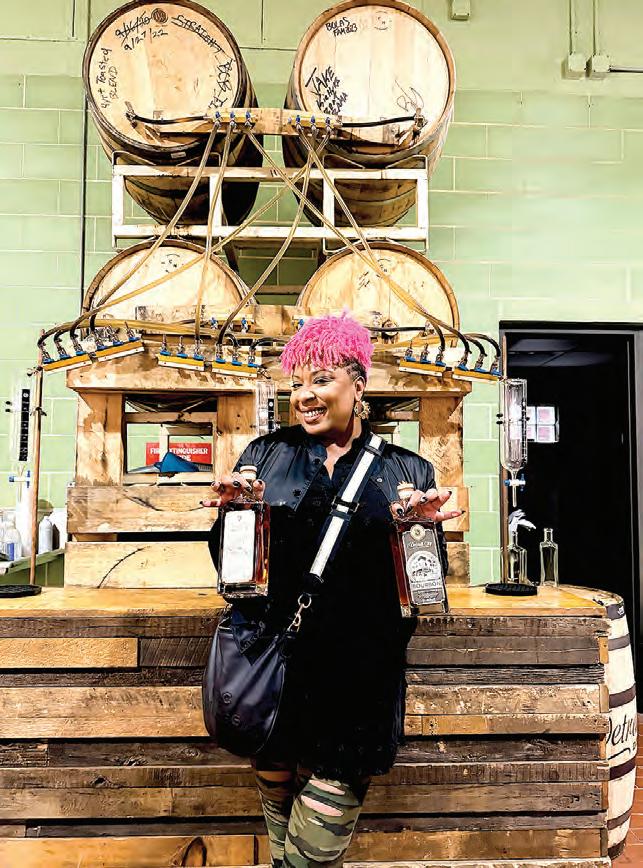
By Miss AJ Williams
Detroit’s Eastern Market is always buzzing with craft, culture, and community. Still, on a crisp Halloween weekend, it transformed into a spirited lab of liquid alchemy thanks to Detroit City Distillery’s newest offering: The BYOB (Blend Your Own Bourbon) Experience — and it did not disappoint.
Held inside the brand’s moody and stylish 100 Proof Event Space, this installment of the BYOB series went full mad-scientist-meets-master-distiller, complete with white lab coats for guests that turned the whole room into a bourbon-blending bunker straight out of a sci-fi flick.
As we sipped, swirled, and blended, the room buzzed with curiosity and creativity. Glasses clinked, laughter echoed, and spirits — both literal and metaphysical — were high.

And at the center of this brilliant bourbon chaos? Michael, the tour guide and host, deserves his own gold-embossed bottle label. With the perfect mix of wit, whiskey wisdom, and just the right amount of snark, Michael turned what could’ve been a basic booze tasting into a full-blown sensory adventure. Think: part history lesson, part flavor masterclass, and part comedy roast, all while keeping us engaged, educated, and a little bit tipsy.
During the two-hour experience, guests were guided through a

From page B-1
and home. The space itself bridges the historical and the modern: original architectural details meet contemporary furnishings, while archival imagery connects diners to the property’s rich past.
Just steps from the dining room, the Inn’s new cocktail bar, Four Vagabonds, takes a more spirited approach to storytelling. Named after the road-tripping circle of Henry Ford, Thomas Edison, Harvey Firestone, and John Burroughs, the lounge is intimate and atmospheric, with a drinks menu that celebrates American ingenuity and craftsmanship. The cocktails, many made with house-infused spirits and herbs grown on-site, nod to the adventurous and experimental nature of its namesakes.
Each offering—from smoked old fashioneds to garden gin spritzes—feels like a love letter to the golden age of invention. Even the bar snacks reflect a creative fusion of history and flavor, with familiar ingredients elevated in playful, unexpected ways. It’s the kind of place that invites lingering, where every sip and bite carries a touch of narrative.
The culinary evolution of the Dearborn Inn doesn’t stop at ambiance or innovation. Behind the scenes, the team is committed
From page B-1
smoky backbone that makes bourbon lovers swoon. Then came the fun part: blending our own custom bottle of bourbon using real distilling techniques.
The Halloween-themed edition was a knockout but make no mistake — this experience is a vibe year-round. Whether you’re a seasoned whiskey connoisseur or someone just dipping a toe into brown liquor for the first time, BYOB is a 5 out of 5 across the board for experience, price, and taste. You’ll walk away with your own custom bottle, a few new friends, and a deeper appreciation for the craftsmanship behind every pour.
So, next time you’re in the D and looking
to sustainable practices, partnerships with local Black and Indigenous farmers, and a broader mission to build a kitchen rooted in equity and excellence. With Chef Patti at the helm, the food is as thoughtful as it is flavorful.
Guests can also enjoy daily breakfast offerings and curated event menus that reflect the same attention to detail and seasonal rhythm. And with the hotel’s expansive gardens—both ornamental and edible—there’s a sense that the food here is not just cooked, but cultivated with intention.
By marrying past and present in such a tangible way, the Dearborn Inn reminds us that food, like history, is best experienced with all the senses. Whether you’re enjoying a quiet dinner inspired by Clara Ford’s legacy or sipping a cocktail steeped in turnof-the-century lore, one thing is certain: here, every meal tells a story worth savoring.
Miss AJ’s Rating
Food: ★★★★★
Service: ★★★★★
Cocktails: ★★★★★
Atmosphere: ★★★★★
Refined yet grounded, this culinary revival offers more than a taste of the past— it’s a full-sensory tribute to American creativity, with a warmth that lingers long after the last bite.
to elevate your weekend plans? Pull up to Detroit City Distillery. Channel your inner bourbon scientist. And let Michael lead you through a night that’s equal parts fun and flavor.
Because in Detroit, we don’t just drink bourbon. We build it.
Miss AJ Tip: Book early. Spots for the BYOB experience fill up fast, especially during themed weekends. Visit https://www.detroitcitydistillery.com/ for more information and tickets.

Rating: Where: Detroit City Distillery, 100 Proof Event Space, Eastern Market Host: Michael the Magnificent (my words, not his, but facts are facts) Cost: Worth every single drop.

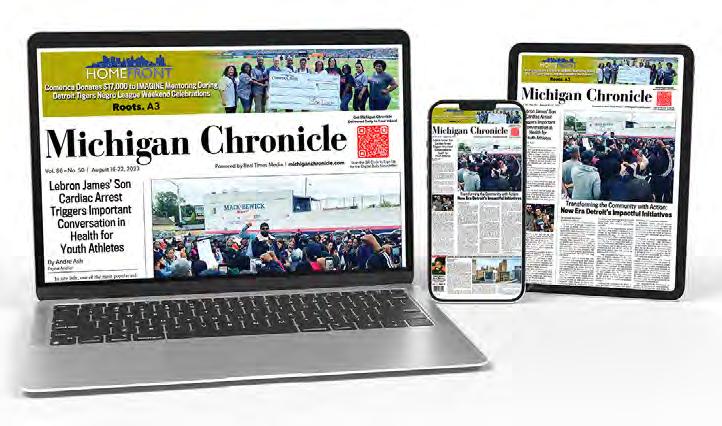



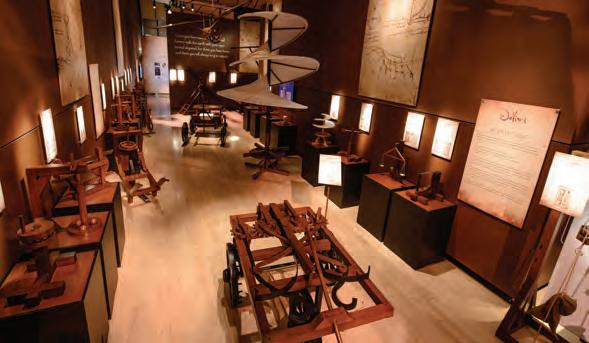




By Jeremy Allen
EXECUTIVE EDITOR
For Detroiters, there’s something magical about the holidays downtown, with the lights glowing down Woodward, the smell of roasted nuts in the cold air, and the memories of generations who made their way to Hudson’s every year to shop and celebrate the seasons.
That familiar joy is coming back this season, as Bedrock announced a lineup of holiday events at the new Nick Gilbert Way at Hudson’s.
Nick Gilbert Way is a new public plaza connecting Woodward Avenue to Farmer Street, where the community can gather to enjoy holiday pop-ups, live entertainment, good food, and a healthy dose of nostalgia. The outdoor space sits between the Hudson’s Block Building and Hudson’s Tower, creating a festive hub that revives the traditions that once made the original J.L. Hudson Department Store the heart of Detroit’s holiday season.
For decades, Hudson’s wasn’t just a store—it was an experience. Families came downtown to watch the Thanksgiving Day Parade, shop for gifts, and marvel at the famous window displays. For many Detroiters, especially those who grew up when downtown was buzzing with department store shoppers and Christmas lights, Hudson’s was where holiday dreams came to life. Bedrock said its revival aims to bring that same spirit to a new generation.
Bear at Hudson’s – a plush collectible that pays tribute to Hudson’s long history as a family favorite. The bear is both a nostalgic keepsake and a charitable gesture, with a portion of proceeds benefiting NFX and The Gilly Project in memory of Nick Gilbert.
Un Deux Trois—a French-inspired café truck operated by Café Sous Terre—will serve hot drinks and sweet treats. Visitors can warm up with Parisian hot chocolate, espresso drinks, and pastries, or snack on fresh donuts, roasted nuts, and other festive bites while strolling through the plaza.
Families will also find plenty of interactive fun woven into the experience. Children can “mail” letters to Santa at a special post box, meet Mrs. Claus and her cheerful elves, and enjoy the playful charm of Lucia, a life-size ballerina box installation created by artists Anne Lagacé and Gonzalo Soldi.

Of course, no Hudson’s holiday would be complete without the return of the iconic window displays that once lined Woodward Avenue. In partnership with the Detroit Historical Society, Hudson’s Detroit is bringing that tradition back, unveiling historic displays that showcase artifacts from the earliest days of the J.L. Hudson Co., spanning from the late 1800s through the mid-20th century. These windows—filled with vintage details, holiday scenes, and a touch of Detroit history—serve as a bridge between past and present, reminding visitors of the city’s rich retail and cultural legacy.
By Ebony JJ Curry SENIOR REPORTER
Detroit’s holiday season returns to center stage on Friday, Nov. 21, when the 22nd Annual Detroit Tree Lighting Presented by the DTE Energy Foundation, produced by the Downtown Detroit Partnership, fills Campus Martius Park with music, performances, skating and community celebration from 4 p.m. to 9 p.m.
The event continues as one of the largest public gatherings in downtown each year, drawing more than 100,000 visitors.
The focal point of the evening is a 62-foot Michigan-grown Norway spruce from Mesick. It will stand decorated with more than 25,000 LED lights and oversized ornaments. The moment of the lighting arrives alongside Santa’s entrance, marking the seasonal shift many Detroit families look forward to.
This year, the event expands its reach with WDIV Local 4 as the new exclusive broadcast partner. Coverage will air from 7 p.m. to 9 p.m., streaming through Local 4+ and ClickOnDetroit, along with live daylong segments and interviews leading into the evening program.
Nick Gilbert Way, named in honor of Dan and Jennifer Gilbert’s late son, officially opened on Nov. 6, kicking off a season-long celebration filled with sights, sounds, and tastes of the holidays. The plaza will host programming through early January, giving people yet another reason to head downtown, reconnect, and make new memories.
One of the most striking sights this season is The Flag at Hudson’s, a massive American flag raised on the Woodward Avenue façade. Measuring 141 by 85 feet, the banner is a nod to the historic Hudson’s flag that first appeared in 1923 and once held the title of the largest American flag in the world. This new version will hang proudly through the end of November, serving as a bold and beautiful backdrop to Detroit’s Thanksgiving Day Parade on November 27.
The holiday spirit continues with a mix of local shopping and seasonal fun along Nick Gilbert Way. Visitors can browse vendor carts and kiosks packed with keepsakes, ornaments, postcards, and puzzles, as well as goods from Detroit-based small businesses like POST and Halie & Co. It’s a perfect opportunity to support local entrepreneurs while picking up unique gifts that reflect the creativity and craftsmanship of the city.
One special item sure to capture attention is The
Adding to the festive lineup, General Motors has created its own holiday windows at Entrance One, the new public showroom space. These two large displays blend the nostalgic holiday style of Hudson’s with GM’s automotive heritage, offering visitors a glimpse of Detroit’s deep connection between creativity, craftsmanship, and community pride.
Those exploring Hudson’s Detroit will also discover new retail options, with stores like ALO and Tecovas opening their doors just in time for the season.
From stylish athleisure to handcrafted boots, these shops add to the growing energy downtown, creating a mix of modern retail alongside classic holiday cheer.
Hudson’s for the Holidays will run now through January 4, with regular hours on Thursdays and Fridays from 4-8 p.m., Saturdays from 12-8 p.m., and Sundays from 12- 6 p.m. Extended hours begin December 15.
For many in the city’s Black community, Hudson’s carries deep personal meaning. It serves as a reminder of family trips downtown, of seeing the city shine bright, and of Detroit’s power to reinvent itself without losing its heart. The new Nick Gilbert Way hopes to provide that spirit of renewal, turning a once-empty stretch of downtown into a place filled with laughter, music, and the unmistakable energy of Detroit during the holidays.
By Jeremy Allen
EXECUTIVE EDITOR
Detroit’s holiday season will shine
a little brighter this year as the Detroit Youth Choir (DYC) teams up with Tabernacle Missionary Baptist Church to present “Soul Holidays: A Celebration of the King!!” The festive Christmas concert is set to take place on Saturday, December 13, 2025, at 6:30 p.m. at Tabernacle Missionary Baptist Church, 2080 W. Grand Blvd., Detroit, MI 48208. Now in its 29th year, the Detroit Youth Choir continues to be a cultural cornerstone for the city, inspiring young people through music, dance, and artistic expression. This year’s holiday celebration will merge the choir’s signature soulful energy with the sacred spirit of Christmas, creating a performance that blends traditional carols with gospel flair, choreography, and the vibrant artistry that has made DYC one of Detroit’s most beloved youth ensembles.
The event promises to be more than just a concert—it’s a community gathering designed to uplift, inspire, and remind audiences of the joy and meaning of the holiday season. The collaboration between DYC and Tabernacle Missionary Baptist Church reflects a shared mission to nurture faith, creativity, and hope among Detroit’s youth. Both institutions have long histories of

“Our Detroit Tree Lighting tradition continues to captivate and entertain all who attend. It brings the community together in celebration and invites families to return throughout the winter to ice skate, shop, dine and explore Downtown,” said David Cowan, chief public spaces officer at the Downtown Detroit Partnership. “At the same time, it fuels economic activity by drawing in over 100,000 visitors in one night. It drives foot traffic that supports our local restaurants, retailers and small businesses and helps power both the downtown holiday spirit and economy.”
“The Detroit Tree Lighting is a tradition that marks the start of the holiday season for our city,” said Rodney Cole, President, DTE Foundation and DTE Corporate Citizenship. “Each year, this event brings a sense of excitement and anticipation as we gather to celebrate the spirit of Detroit. Lighting the tree is a moment that reminds us of the energy and resilience that define our community.”
“For 22 years we have watched the tree grow a little bigger and more beautiful,” said Scott and Mary Locklear, whose property the tree was grown and harvested. “It’s an honor to have it chosen for this year’s Detroit Tree Lighting. We’re so happy and proud to share its beauty with everyone. Happy holidays and be sure to visit Campus Martius Park to see the tree in all its shining glory.”
Performances and Music
The MGM Grand Detroit Main Stage will spotlight:
• BRELAND, the multi-platinum country artist known for his genre-blending sound and holiday performances.
• Natalie Jane, a rising pop vocalist with a strong digital following.
• Urban Arts Orchestra, led by De’Sean Jones.
• Performers from Hitsville NEXT, Grosse Pointe Theatre, and the Cass Tech Madrigal Choir
• A featured vocalist from the upcoming Broadway in Detroit production of The Phantom of the Opera, arriving to the Detroit Opera House in 2026.
Live Skating Program
The Rink at Campus Martius Park will host an ice performance headlined by U.S. Olympian Polina Edmunds. She will be joined by Emmanuel Savary, Khloe Felton, and skaters representing metro Detroit skating clubs including Figure Skating in Detroit, Detroit Skating Club, Livonia Figure Skating, and others. The rink officially opens to the public for the season on Saturday, Nov. 22.
Food, Vendors and Community Giving Campus Martius and Cadillac Square will feature food trucks including Andiamo, Busta Dogs, Los Dos Amigo Tacos, Food Fun Express and Impasto. Beverage stations will serve seasonal favorites including hot cocoa, with $1 from each cocoa purchase supporting Forgotten Harvest. Attendees are encouraged to bring new gloves or mittens to support Mittens for Detroit. Volunteers will collect donations at entrances. Carhartt will offer the Carhartt Cares Front Row experience for Detroit Goodfellows families and distribute free hats, while Chick-fil-A will provide free sandwiches while supplies last. Santa and Detroit sports mascots Roary, Hooper and Paws will be present for photos, alongside sponsor activations and light features in Winter Sponsor-land.
Beacon Park Winter Kickoff
Beacon Park will host “Light Up Beacon Park” from 5 to 9 p.m., including a 6:45 p.m. tree lighting and the debut of a new Candyland-themed winter display. Beacon Park’s heated Design Haus will host rotating community events through the season.
Planning for Attendance
Crowds are expected to reach capacity early. Visitors are encouraged to arrive in advance, make dining reservations, and consider public transit including DDOT, SMART, QLINE and the Detroit People Mover.
The tree will remain lit throughout the season, inviting Detroiters back downtown to skate, gather, and share time with loved ones — the rhythms of winter in the city returning once again.

empowering young people, and this partnership continues that legacy through the performing arts. Audiences can expect an evening filled with harmonies, movement, and an atmosphere of celebration. The choir’s approach to music—infusing contemporary beats with classical and gospel traditions—creates a dynamic performance that resonates across generations. The title “A Celebration of the King!!” underscores the spiri-
tual focus of the event, honoring the birth of Christ while also celebrating the gift of music and community. Tickets for Soul Holidays are available for $25 general admission and can be purchased through DetroitYouthChoir.org. As in previous years, proceeds from DYC performances help sustain programming that supports Detroit-area youth in developing their artistic talents and leadership skills. Following the concert, the Detroit Youth
Choir will open its doors to a new group of young performers. Open auditions are scheduled for Saturday, January 3, 2026, from 12 p.m. to 5 p.m. at Marygrove Conservancy, 8425 W. McNichols, Detroit, MI 48221, on the fourth floor of the main building (LA Building).
Students between the ages of 8 and 18 (excluding high school seniors) are encouraged to apply by submitting a short audition video that includes an introduction, a song performance, and a statement about their interest in joining the group. Videos should be emailed to DYCauditions@yahoo.com by Wednesday, December 31, 2025, at 11:59 p.m.
Over nearly three decades, the Detroit Youth Choir has evolved from a small church-based group into a nationally recognized organization, while maintaining deep roots in Detroit’s neighborhoods. Its ongoing work with young people emphasizes discipline, teamwork, and self-expression through the arts. As the group prepares for its 29th year, the combination of a Christmas concert and open auditions shows that DYC isn’t slowing down. The organization continues to expand its reach and impact, using the stage as a platform for Detroit’s next generation of artists.

By Tiffany J. Gunter GENERAL MANAGER, SMART
Transit is not a fallback. It is a foundation. In Southeast Michigan, public transit has too often been treated as a safety net, something to fall back on only when all other options fail. But if we want a region that truly works for everyone, we must reframe how we think about mobility. At its core, public transit is about something very simple: respect.

Respect means recognizing that mobility is a right, not a privilege. Every day at SMART, we see how the ability to travel from point A to point B can transform lives. Detroit community and business leader Dave Logan used SMART as a young man to reach a better school and pursue greater academic opportunity. Detroit-based photographer Corey Turner leaned on SMART to stay on track with his education after his car was stolen in college. Don Brown, a former Chair of the Macomb County Commission and once a strong transit skeptic, became one of our greatest champions after a health challenge showed him how transit preserved his independence.
These stories are powerful because they are relatable. Even if you do not ride every day, you know what it feels like when life changes unexpectedly. The car breaks down. The job shifts to a new location. A family member needs you. Transit is there for those moments. It provides security, continuity, and opportunity.
Respect also shows up in the details. It is the shelter that protects a rider from rain or summer heat. It is the USB port that lets a parent respond to a child’s message while heading home. It is the lighting that makes a stop feel safe late at night. It is the ADA ramp that ensures older adults and people with disabilities are not excluded from everyday life. It is the professionalism of operators, many of whom once rode the bus themselves, who now dedicate their careers to connecting people, protecting safety, and uplifting their communities.
Respect means listening. With SMARTer Mobility, we are building service around how people actually live. Riders want reliability and clarity. They want clean buses, straightforward schedules, and technology that reduces friction from the daily commute. They want to feel respected not only in the ride itself but in how the system values their time, their safety, and their dignity.
Transit is more than transportation. It is the connective tissue of Southeast Michigan’s economy and community life. It links workers to opportunity, families to health care, students to classrooms, and neighbors to one another. When we treat transit as a foundation, we reinforce something deeper than a route map. We strengthen a shared belief that everyone deserves to move through this region with dignity.
At SMART, we are committed to building a system that reflects that belief. We are not just improving buses and stops. We are building trust. Respect means showing up for riders, for workers, and for the future of Southeast Michigan. It means creating a region where everyone belongs and where everyone can move forward together.



By Sam Robinson SENIOR REPORTER
Voters tasked with choosing the next Detroit City Council member in District 7 replaced a pro-business former state legislator with a self-described leftist whose campaign was largely funded by Democratic Socialists across the country.
Denzel McCampbell, 34, pledged during his city council campaign to bring the power of the west side district’s council office to the people. He said in an interview on Tuesday, Nov. 4, one of the first tasks on the council would be to explore how Detroit can implement a resident-driven funding model.
While the August primary was decided by 50 votes, the general election fared worse for state Rep. Karen Whitsett, D-Detroit, who was defeated by McCampbell, a former city charter commissioner and member of the Metro Detroit Democratic Socialists and Working Families Party.
McCampbell beat Whitsett by nearly 3,000 votes. He received 59% of the vote, to Whitsett’s 40%.
“Congratulations Councilman McCampbell!” Whitsett said on social media. “Your hard work paid off. Now let’s work together to keep Detroit moving forward.”
McCampbell told Michigan Chronicle he wants to explore implementing district-by-district participatory budgeting, a process that lets community members decide how to spend all or part of a public budget. Supporters say it gives residents actual power over how public dollars are spent.
“We have council by district, and having a pot of money that residents can come together and decide on, whether it’s a pocket park in the community or a different kind of project, we should be able to get behind that and really bring folks together,” McCampbell said.
Chicago was the first major city to adopt participatory budgeting in 2009, followed by New York City in 2011. Today, the process spans various city districts, but the first project involved just one ward with 60,000 inhabitants.
In the first process in Chicago, any resident of a target area above 16 submits ideas to improve the district’s infrastructure. Then, a selected committee of community representatives and volunteers evaluated the ideas and turned them into proposals.





All district residents voted for the winning proposals, and the winning 16 of 36 proposals were recommended to the relevant city department.
Participatory budgeting in Chicago has been a success and is now implemented in various wards throughout the city. The proposal submissions and voting are managed online, so residents can engage with the projects more regularly and at their convenience.
McCampbell also said that one of his first priorities after being sworn in on Jan. 1 will be alleviating the property tax burden.
“How do we look at other sources of revenue to help alleviate property taxes folks are having to pay?” McCampbell said.
McCampbell says he will continue to engage residents to identify needs ahead of the city budgeting process next year, reiterating his campaign pledge to address the desires of residents who don’t typically get a seat at the table.
“You look at Zohran’s campaign, you think about District 7, you think about the city of Detroit, folks want representatives that are putting them first, that are making sure it’s more affordable to live in Detroit,” McCampbell said. “Also, this dynamic that the power is with our residents, that the power is not with corporations, the power is not with billionaires.”
Neither McCampbell or Santiago-Romero accepted donations to their campaigns from corporate PACs, which has become a hallmark of progressive campaigns.
“When I talk to people about not taking corporate PAC dollars, they’re like, ‘Oh, that’s what we need because you’re going to be accountable to us.’ I think that’s what folks are getting



behind, they’re tired of politics as usual. They really want something fresh and that’s what I’m trying to bring,” McCampbell said.
The Metro Detroit Democratic Socialists of America chapter was a major part of McCampbell’s operation, having knocked on over 18,000 doors on his behalf during the campaign. He raised more than $160,000 from donors across the country, more than any council candidate.
“Denzel’s victory is a demonstration of a trend visible in New York City and across the country — DSA’s model of grassroots organizing building for working people across lines of color and gender is effective and popular,” the organization said in a press release.
McCampbell currently works as the managing director of Progress Michigan, a left-leaning statewide advocacy organization. He’s worked as a communications director for U.S. Rep. Rashida Tlaib.
He will replace former state Rep. Fred Durhal III, who was elected after winning the seat by dozens of votes in 2021.
District 7 spans across the city’s northwest side from Puritan, Livernois, Tireman, Greenfield, to W. Warren and the city limit to the I-96 Jeffries Freeway.
Sam can be reached at srobinson@ michronicle.com.

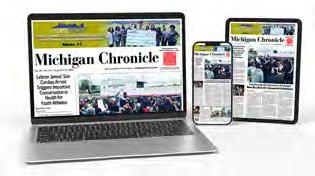





The Michigan Department of Environment, Great Lakes, and Energy (EGLE) is holding a public comment period and a virtual public hearing, if requested, to allow the public the opportunity to comment on the proposed conditional approval of an air permit.
The public comment period is open from November 6, 2025, until December 15, 2025, with a virtual public hearing, if requested, on December 10, 2025, for:
The Michigan Department of Environment, Great Lakes, and Energy (EGLE) is holding a public comment period and a virtual public hearing, if requested, to allow the public the opportunity to comment on the proposed conditional approval of an air permit.
The Michigan Department of Environment, Great Lakes, and Energy (EGLE) is holding a public comment period and a virtual public hearing, if requested, to allow the public the opportunity to comment on the proposed conditional approval of an air permit.
Company: Detroit Salt Company located at 12841 Sanders Street and 10335 Flora Street in Detroit, Michigan
The Michigan Department of Environment, Great Lakes, and Energy (EGLE) is holding a public comment period and a virtual public hearing, if requested, to allow the public the opportunity to comment on the proposed conditional approval of an air permit.
The public comment period is open from November 6, 2025, until December 15, 2025, with a virtual public hearing, if requested, on December 10, 2025, for:
What is open for comment: Air Permit Application Package No. PKG-0000453 is
The public comment period is open from November 6, 2025, until December 15, 2025, with a virtual public hearing, if requested, on December 10, 2025, for:
The public comment period is open from November 6, 2025, until December 15, 2025, with a virtual public hearing, if requested, on December 10, 2025, for:
Company: Detroit Salt Company located at 12841 Sanders Street and 10335
a request to increase the company’s salt processing limit, the amount of salt that can be transported by truck, and the amount of salt that can be brought to the marine terminal.
Flora Street in Detroit, Michigan
Technical details:
Company: Detroit Salt Company located at 12841 Sanders Street and 10335 Flora Street in Detroit, Michigan
Company: Detroit Salt Company located at 12841 Sanders Street and 10335 Flora Street in Detroit, Michigan
What is open for comment: Air Permit Application Package No. PKG-0000453 is a request to increase the company’s salt processing limit, the amount of salt that can be transported by truck, and the amount of salt that can be brought to the marine terminal.
What is open for comment: Air Permit Application Package No. PKG-0000453 is a request to increase the company’s salt processing limit, the amount of salt that can be transported by truck, and the amount of salt that can be brought to the marine terminal.
Technical details:
The public comment period and, if requested, virtual public hearing are to allow all interested parties the opportunity to comment on the proposed conditional approval of a Permit to Install (PTI). It has been preliminarily determined that increasing the permit limits will not violate any of EGLE’s rules nor the National Ambient Air Quality Standards. The facility’s impact will not exceed the Significant Impact Level for particulate matter less than or equal to 2.5 microns in diameter
What is open for comment: Air Permit Application Package No. PKG-0000453 is a request to increase the company’s salt processing limit, the amount of salt that can be transported by truck, and the amount of salt that can be brought to the marine terminal.
Technical details:
Provide comment in any of these ways by December 15, 2025:
Technical details:
• Online: MiEnviro Portal

The public comment period and, if requested, virtual public hearing are to allow all interested parties the opportunity to comment on the proposed conditional approval of a Permit to Install (PTI). It has been preliminarily determined that increasing the permit limits will not violate any of EGLE’s rules nor the National Ambient Air Quality Standards. The facility’s impact will not exceed the Significant Impact Level for particulate matter less than or equal to 2.5 microns in diameter.
• Email: EGLE-AQD-PTIPublicComments@Michigan.gov
• Voicemail: Call 517-284-0900
The public comment period and, if requested, virtual public hearing are to allow all interested parties the opportunity to comment on the proposed conditional approval of a Permit to Install (PTI). It has been preliminarily determined that increasing the permit limits will not violate any of EGLE’s rules nor the National Ambient Air Quality Standards. The facility’s impact will not exceed the Significant Impact Level for particulate matter less than or equal to 2.5 microns in diameter
The public comment period and, if requested, virtual public hearing are to allow all interested parties the opportunity to comment on the proposed conditional approval of a Permit to Install (PTI). It has been preliminarily determined that increasing the permit limits will not violate any of EGLE’s rules nor the National Ambient Air Quality Standards. The facility’s impact will not exceed the Significant Impact Level for particulate matter less than or equal to 2.5 microns in diameter
Provide comment in any of these ways by December 15, 2025:
• Mail: Permit Section Manager, EGLE, AQD, P.O. Box 30260, Lansing, Michigan 48909-7760
Provide comment in any of these ways by December 15, 2025:
• Online: MiEnviro Portal
At the virtual public hearing, if requested on December 10, 2025, starting at the close of the informational session.
Online: MiEnviro Portal
• Email: EGLE-AQD-PTIPublicComments@Michigan.gov
• Email: EGLE-AQD-PTIPublicComments@Michigan.gov
Voicemail: Call 517-284-0900
• Voicemail: Call 517-284-0900
The virtual public hearing will only be held if requested in writing by December 3, 2025.
• Send hearing requests to the email or address listed above.
Provide comment in any of these ways by December 15, 2025:
• Mail: Permit Section Manager, EGLE, AQD, P.O. Box 30260, Lansing, Michigan 48909-7760
Mail: Permit Section Manager, EGLE, AQD, P.O. Box 30260, Lansing, Michigan 48909-7760
• Online: MiEnviro Portal
Email: EGLE-AQD-PTIPublicComments@Michigan.gov
• At the virtual public hearing, if requested on December 10, 2025, starting at the close of the informational session. The virtual public hearing will only be held if requested in writing by December 3, 2025.
• If requested, information on how to attend will be posted by December 5, 2025, at Michigan.gov/ EGLEAirPublicNotice
• At the virtual public hearing, if requested on December 10, 2025, starting at the close of the informational session.
Get technical reports about this project:
• Voicemail: Call 517-284-0900
The virtual public hearing will only be held if requested in writing by December 3, 2025.
• Online at Michigan.gov/EGLEAirPublicNotice, choose ‘Applications Open for Comment’
• Send hearing requests to the email or address listed above.
• Detroit: EGLE, AQD, 313-456-4681
Send hearing requests to the email or address listed above.
• Mail: Permit Section Manager, EGLE, AQD, P.O. Box 30260, Lansing, Michigan 48909-7760
• If requested, information on how to attend will be posted by December 5, 2025, at Michigan.gov/EGLEAirPublicNotice.
• Detroit: City Clerk’s Office, 313-224-1990
• At the virtual public hearing, if requested on December 10, 2025, starting at the close of the informational session.
If requested, information on how to attend will be posted by December 5, 2025, at Michigan.gov/ EGLEAirPublicNotice
Get technical reports about this project:
Get technical reports about this project:
• Detroit: Wayne County Clerk’s Office, 313-967-6938 Lansing: EGLE, AQD, 517-648-6663
• Online at Michigan.gov/EGLEAirPublicNotice, choose ‘Applications Open for Comment’
• Online at Michigan.gov/EGLEAirPublicNotice, choose ‘Applications Open for Comment’
The virtual public hearing will only be held if requested in writing by December 3, 2025.
• Detroit: EGLE, AQD, 313-456-4681
Requests for translation or other accessibility concerns can be sent to: EGLE-Accessibility@Michigan.gov
• Detroit: EGLE, AQD, 313-456-4681
• Send hearing requests to the email or address listed above.
Puede enviar solicitudes de traducción u otras cuestiones de accesibilidad a: 800-662-9278
• Detroit: City Clerk’s Office, 313-224-1990
Detroit: City Clerk’s Office, 313-224-1990
• Detroit: Wayne County Clerk’s Office, 313-967-6938
800-662-9278 EGLEAccessibility@Michigan.gov
Detroit: Wayne County Clerk’s Office, 313-967-6938
• If requested, information on how to attend will be posted by December 5, 2025, at Michigan.gov/ EGLEAirPublicNotice
• Lansing: EGLE, AQD, 517-648-6663
• Lansing: EGLE, AQD, 517-648-6663
Get technical reports about this project:
MICHIGAN DEPARTMENT OF ENVIRONMENT, GREAT LAKES, AND ENERGY
Requests for translation or other accessibility concerns can be sent to: EGLE-Accessibility@Michigan.gov
Puede enviar solicitudes de traducción u otras cuestiones de accesibilidad a: 800-662-9278
• Online at Michigan.gov/EGLEAirPublicNotice, choose ‘Applications Open for Comment’ Detroit: EGLE, AQD, 313-456-4681
800-662-9278
• Detroit: City Clerk’s Office, 313-224-1990
EGLEAccessibility@Michigan.gov
• Detroit: Wayne County Clerk’s Office, 313-967-6938
• Lansing: EGLE, AQD, 517-648-6663
MICHIGAN DEPARTMENT OF ENVIRONMENT, GREAT LAKES, AND ENERGY
Cindy Smith, Permit Section Manager
Requests for translation or other accessibility concerns can be sent to: EGLE-Accessibility@Michigan.gov
Puede enviar solicitudes de traducción u otras cuestiones de accesibilidad a: 800-662-9278
800-662-9278
EGLEAccessibility@Michigan.gov
Cindy Smith, Permit Section

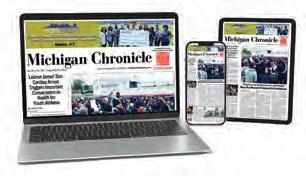


(StatePoint) Each year, 500 to 1,000 people in the United States are diagnosed with pulmonary arterial hypertension (PAH), a rare lung disease that can be fatal if left untreated.
To encourage earlier diagnosis of PAH, the American Lung Association, with support from Johnson & Johnson, is sharing information about the disease, its symptoms, and the importance of testing and proper treatment. Here’s what the Lung Association wants you to know:

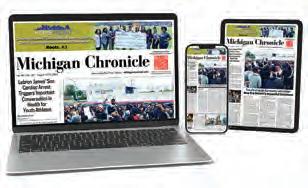

What is PAH? PAH is a rare, progressive lung disease caused when the tiny arteries in your lungs become thickened and narrowed. This blocks blood flow through your lungs, causing the blood pressure in your lungs to rise. The heart has to work harder to pump blood through the narrowed arteries. Over time, your heart has difficulty effectively pumping blood through your body.
What are the symptoms of PAH? In the early stages, you may not notice symptoms. As PAH progresses, common symptoms include shortness of breath, especially with activities like walking up the stairs or long distances, fatigue, edema (swelling of the feet, legs and eventually the abdomen and neck), dizziness and fainting spells, chest pain, heart palpitations, and lips and fingers turning blue. Contact your healthcare provider if you’re experiencing these or any worrisome symptoms.
Who is most at risk? While anyone can get PAH, those most at risk are women ages 30-60, and Black and Hispanic women.
Why is PAH difficult to diagnose? Because symptoms of PAH are similar to other diseases, the average time it takes to get a diagnosis is about 3 years. This delay can be frustrating for patients and their families, and can result in poorer health outcomes. Unfortunately, health disparities exist due to a wide-range of factors, like lack of access to healthcare, health insurance coverage, transportation to specialists, and health literacy, and can exacerbate these delays. Increasing awareness of this rare disease can help patients get a quicker diagnosis so they can get the treatment they need.
Elva V., a mom and nurse, has been living with PAH since she was 23. She shares that getting the correct diagnosis and treatment plan has been a “game changer,” helping her “feel well enough to do the things I enjoy and live a good life with my daughters.”

How can the path to diagnosis be shortened? Your provider may order several tests to help with diagnosis:
• A simple blood test, the BNP test (also called B-type natriuretic peptide test) or NT-proBNP test, can help determine if your heart is working harder than it should, a sign that you may have PAH. Getting this test done early can help speed the path to diagnosis.
• Electrocardiogram to show the electrical activity of your heart.
• Echocardiogram to check the size and condition of your heart.
• Lung function tests.
• A right heart catheterization to confirm PAH, once your provider suspects it. How is PAH treated? PAH-specific medications come in multiple forms: oral, inhaled and subcutaneous. Some allow blood to flow more easily through the arteries of your lungs. Others improve heart and lung function. PAH medications help slow how quickly your disease worsens. For optimal health outcomes when dealing with a rare disease like PAH, it’s best to see a specialist.
“When seen by a specialist, you’ll receive the latest treatment and resources to help you live your best life,” says Dr. Michael Cuttica, a pulmonary hypertension specialist.
That is certainly the case for Lindsay T., who has been living with PAH since her early twenties and works with her doctor to manage her care. “My BNP has been within a normal range since I alerted my specialist that my symptoms were getting worse and he adjusted my medications,” she says.
If you have unresolved respiratory symptoms that are not improving with your current treatment, learn more about PAH at Lung.org/pah.
A PAH diagnosis doesn’t have to be delayed. With the right tests and care from a specialist, you can get on the path to the treatment you need.



Ed Siaje President,

